#doesn’t help I never learned how to like be constructive or move past my negative emotions or whatever I just stuffed them down & got on
Explore tagged Tumblr posts
Text
Man shit feels so bad today what gives
#like everything in the world just feels so dire & sad & hopeless rn & shit in my Personal Life also feels dire & sad & hopeless#which isn’t like an unusual line of thought for me ig but today it’s just really making me feel so sad & upset & stuck in a hole abt it. idk#like I don’t know my antidepressants aren’t working today or smth I don’t know I’m so miserable rn tho everything sucks whatever#trying to wash the dishes without crying barely succeeding at both I feel so fucking stupid man idk what’s going on w me today.#doesn’t help I never learned how to like be constructive or move past my negative emotions or whatever I just stuffed them down & got on#meds that make me not feel that way anymore most of the time. so when smth manages to slip through I just feel fucking miserable for a while
4 notes
·
View notes
Text
Dr. Karen Hawk, Psychologist: Overcoming Self-Doubt and Boosting Self-Confidence
Empowering Yourself to Achieve Your Full Potential
Self-doubt is a common and natural experience that everyone faces at some point in life. It can manifest in many forms: questioning your abilities, fearing failure, or worrying about how others perceive you. While a little self-doubt can motivate us to grow, excessive self-doubt can hold us back from reaching our goals and living fulfilling lives. If left unchecked, it can erode self-confidence, leading to anxiety, stress, and missed opportunities.
Dr. Karen Hawk, a psychologist in Gilbert, Arizona, specializes in helping individuals overcome self-doubt and build lasting self-confidence. Through therapy, Dr. Hawk provides practical strategies to help individuals identify the root causes of their self-doubt, challenge negative beliefs, and develop the skills needed to achieve personal growth. In this blog, we’ll explore how Dr Karen Hawk Psychologist Gilbert Arizona approach to therapy can empower you to move past self-doubt and enhance your confidence in every area of your life.
Understanding Self-Doubt and Its Impact
Self-doubt often stems from negative thoughts and beliefs about oneself. These doubts can be triggered by external pressures—such as societal expectations, comparison to others, or critical feedback—or by internal factors like past failures, insecurities, or unresolved emotional wounds. While occasional doubt is part of the human experience, persistent or intense self-doubt can significantly impact a person’s emotional well-being and quality of life.
When self-doubt takes hold, it can create a cycle of negative thinking that prevents individuals from taking risks, pursuing their dreams, or fully embracing opportunities. This fear of failure or judgment can create barriers to success and hinder personal and professional growth.
Dr Karen Hawk Psychologist Gilbert AZ helps clients recognize that self-doubt is a normal part of the human experience, but it doesn’t have to define you. Through therapeutic interventions, individuals can break free from the grip of self-doubt and replace negative thought patterns with healthier, more empowering beliefs.
Dr. Karen Hawk’s Approach to Overcoming Self-Doubt
1. Identifying the Source of Self-Doubt
The first step in overcoming self-doubt is understanding where it comes from. Dr. Hawk works with individuals to identify the root causes of their self-doubt—whether it’s related to childhood experiences, societal conditioning, past trauma, or even current stressors. By understanding the underlying factors contributing to self-doubt, clients can begin to address them in a compassionate, constructive way.
In therapy, Dr Karen Hawk Psychologist Gilbert helps clients explore past experiences where they may have been criticized, rejected, or made to feel less than. These experiences often contribute to a negative self-image and a fear of not being “enough.” By identifying these sources, individuals can begin to challenge their beliefs and build a healthier, more accurate sense of self.
2. Challenging Negative Thought Patterns
Self-doubt often stems from irrational, negative thought patterns that distort reality. Thoughts like “I’m not good enough,” “I always fail,” or “I’ll never be successful” can reinforce feelings of inadequacy and perpetuate a cycle of self-criticism. Dr. Hawk uses Cognitive Behavioral Therapy (CBT) techniques to help individuals recognize and challenge these negative thoughts.
Through CBT, clients learn to identify automatic negative thoughts and replace them with more balanced, realistic perspectives. For example, instead of thinking, “I can’t do this,” a person may learn to reframe the thought to, “I can try my best, and I’ll learn from any mistakes I make.” This shift in thinking helps individuals build self-efficacy—the belief that they are capable of achieving their goals.
Dr. Hawk also encourages clients to engage in positive self-talk and practice self-compassion. Instead of berating themselves for mistakes, individuals are encouraged to treat themselves with the same kindness and understanding they would offer a close friend.
3. Building Self-Awareness and Self-Acceptance
Self-awareness is a critical component of building self-confidence. When individuals are aware of their strengths, weaknesses, values, and passions, they can make more informed decisions and feel more confident in their choices. Dr. Hawk works with clients to help them discover their authentic selves and embrace their unique qualities.
Through mindfulness practices and self-reflection exercises, individuals can gain insight into their thoughts, emotions, and behaviors. Dr. Hawk emphasizes the importance of self-acceptance—acknowledging both strengths and limitations without judgment. Accepting oneself as imperfect, but still worthy of love and respect, is a key step in overcoming self-doubt.
4. Setting Realistic Goals and Celebrating Successes
A lack of confidence often stems from feeling like one’s goals are unattainable. When individuals set unrealistic expectations or focus solely on the end result, it can lead to frustration and feelings of failure. Dr Karen Hawk Psychologist Gilbert Arizona helps clients set realistic, achievable goals that build momentum and foster a sense of accomplishment.
By breaking down larger goals into smaller, manageable steps, individuals can build confidence with each success, no matter how small. Dr. Hawk encourages clients to celebrate their victories along the way, reinforcing the belief that they are capable of achieving their objectives. These celebrations help individuals recognize their progress and strengthen their sense of self-worth.
5. Embracing Vulnerability and Taking Risks
One of the key ways to build confidence is to face fear and take risks, even when self-doubt is present. Dr. Hawk helps clients understand that vulnerability is a necessary part of growth. Whether it’s taking a step toward a new career, opening up emotionally to others, or pursuing a personal passion, embracing vulnerability helps individuals break through the barriers of self-doubt.
Dr. Hawk uses exposure-based techniques to help clients gradually step out of their comfort zones. By encouraging small, manageable risks, individuals can experience success and build confidence in their ability to navigate uncertainty. Over time, these positive experiences accumulate, helping clients develop a greater sense of courage and self-belief.
6. Building a Supportive Environment
The people we surround ourselves with play a significant role in shaping our confidence. Dr. Hawk encourages clients to assess their social circles and cultivate relationships with supportive, encouraging individuals who foster a sense of self-worth. Positive reinforcement from others can help combat the negative self-talk and self-doubt that often hold individuals back.
Dr. Hawk also emphasizes the importance of setting boundaries with individuals who may contribute to feelings of inadequacy or criticism. By surrounding themselves with positive, uplifting people, clients can create an environment that nurtures growth and self-confidence.
7. Practicing Self-Compassion and Patience
Overcoming self-doubt and building lasting self-confidence is not a quick fix—it’s an ongoing process that requires patience and self-compassion. Dr. Hawk reminds clients that setbacks are normal and that it’s important to be gentle with oneself during times of struggle. Building confidence takes time, and every step, no matter how small, is a victory.
Dr. Hawk encourages clients to practice self-compassion by acknowledging their efforts and treating themselves with kindness. Instead of harsh self-criticism, individuals are encouraged to embrace a mindset of growth and self-love, accepting that confidence is a journey, not a destination.
Conclusion
Overcoming self-doubt and building self-confidence is a transformative journey that requires self-awareness, resilience, and support. Dr. Karen Hawk’s approach to therapy empowers individuals to challenge negative thought patterns, embrace vulnerability, and develop the tools necessary to achieve personal growth. Through therapy, clients can gain the confidence to pursue their goals, face challenges with courage, and live a life that aligns with their true potential.
If you struggle with self-doubt or feel that your confidence is holding you back, Dr. Hawk’s compassionate and evidence-based therapeutic techniques can help you overcome these barriers. With the right support and mindset, you can build the confidence needed to thrive and achieve your dreams.
0 notes
Text
Tips when playing with a Ler IRL
I was talking to a friend of mine the other day after they had a session with someone new that ended up being less than perfect. It inspired me to write up some thoughts and advice.
I’ve noticed that a lot of Tops/Lers can get a bit over-confident about their abilities and feel like they know best and need to take charge, especially around a shy play partner. This can definitely help to move the process along and make things happen, compared to two shy people who might take a long time to build up to play. But the downside is that they might not realize the responsibility that goes with this power, and if they only ever play with shy people they might never get called out on their bad behaviour and learn to be better. Lers: keep this in mind and solicit feedback to improve your skills and help your Lee feel safe and satisfied. Lees: it’s important to speak up about your feelings when you feel safe to do so. It might take some time to get your thoughts in order, so it’s perfectly valid to talk about things days later.
Tops/Lers might assume that what worked for one partner in the past will work for everyone they play with. This is very wrong lol. Everyone I’ve played with has been different and required a fairly lengthy learning process to figure out what worked best for them and how to make it a good experience for them. In my experience, the more you play with someone the better it gets as long as there is open communication before and after the session to discuss the good and bad so things can get better. Lers/Lees: see point 1.
The Ler might have a fantasy in mind for how they want the session to go and don’t really mind pushing your boundaries to get what they want. It’s important to watch for this type of thing because this can be very dangerous. Lers: I can’t stress this enough - make your Lee’s safety/pleasure/satisfaction your top priority. Everything will go so much better and it will greatly increase your chances of getting to play together again. Lees: be on the lookout for this unsafe behaviour and call it out or stay away.
Anyone (but the Lees in particular) might feel super shy during the session and find it difficult to provide feedback in the moment. This doesn’t mean that they now have to keep those feelings to themselves. You are allowed to learn new things about yourself and establish new boundaries and provide feedback on the session after reflecting on it afterwards. Lers: your lee might initially say the session went well but then come back with suggestions on how it could have gone better afterwards. Listen to them and understand that it sometimes takes a while to get their thoughts in order or to build up the courage to provide feedback. Your job is to build a safe place for them to discuss these things with you. Lees: I absolutely think you should send all of your thoughts and concerns to your Ler after the session. If they take your message as constructive feedback and learn to be better than that is a really good sign that they are someone you���d want to play with again. If they get defensive and act negatively then that’s a big red flag to stay away and don’t play with them again.
I’m personally always a bit more cautious when playing with someone who is 100% Ler. If they don’t know what it’s like to be a Lee then it’s extra important to stand up for the things that make a Lee feel safe - a good Ler with know these things but it’s never safe to assume.
And finally - age is no guarantee of ability. Tumblr has been an amazing resource to learn safe bdsm practices and enthusiastic consent, but it’s important to remember that the community on tumblr didn’t exist for the older generation while they were growing up. The online tickling community catered to Ler’s fantasies for most of its history, and still does in many places. Lers: be aware of your biases/blind spots and solicit feedback, invite the safeword, and be extra cautious when playing with a new play partner. Lees: don’t rely on your Ler to know all of this stuff. They absolutely should, but it’s unsafe to assume.
68 notes
·
View notes
Text
a/n: I was listening to more Dua Lipa and I thought to myself “wow Mista would like a lot of these songs” and it just. spiraled from there lmao. these are headcanons that I’ve referenced in previous works, plus some new ones. I also wanted an excuse to talk about 90′s / y2k stuff so..... here are some miscellaneous headcanons about ya fav boys!
tw: mentions of Giorno and Fugo’s backstory
❥ ┋ ❝ random bucci gang headcanons!
bruno bucciarati.
the most fashionable out of the group. he’s not afraid to try daring fabrics and clashing patterns. although he dresses like a Gucci model, Bucciarati hates luxury brand name clothes. it’s such a gross display of wealth. and as someone who grew up in a lower-middle class home, he doesn’t understand why anyone would spend more than 100 euros on a shirt.
Bucciarati doesn’t like sleeping in. he feels like he’s wasted too much of the day if he wakes up past 10 AM. as a result, he tends to wake up somewhere around 5 AM every morning. part of it is out of habit as a fisherman’s son, part of it is being a workaholic. he spends his morning completing paperwork, but if there isn’t any to do, he’ll take a walk around Naples.
he’s the biggest movie fiend behind Mista. although there are some serious films that he really likes, such as Reservoir Dogs, dumb action movies are his guilty pleasure. Water World and Judge Dredd are so fucking awful yet he can’t help but love them.
leone abbacchio.
he’s the one everyone goes to when they need a disguise. Abbacchio knows exactly how to contour your face so that you’re barely recognizable. likewise, he’s really keen on how certain people dress. he can put together an outfit perfect for a masquerade party or infiltrating a construction zone.
Abbacchio is actually quite paternal around the younger members like Narancia and Fugo. kind of like an asshole older brother. he’ll tell them not to do fuckshit, but won’t stop them if they won’t listen. likewise, he’s there to offer an ear if they need it (even if he’s not the best at comforting).
I’ve said it once and I’ll say it again!! Abbacchio is a really good cook. his nonna taught him everything he knows. she’s since passed, so he cooks as a way to feel closer to her and provide for the team. although he likes healthy dishes the most, he tends to make fatty savory foods since that’s what the team likes.
giorno giovanna.
he’s always the last to get jokes. sometimes Fugo will have to explain it to him, but most of the time Giorno will just laugh along with the group to feel included. it’s only recently that he’s been able to let his guard down (especially considering his home life). even if he doesn’t understand the joke, he’s just happy to see everyone smiling.
he’s the first to offer praise to his teammates. despite his stoic exterior, Giorno wants everyone to feel included in what they do. some take it as sarcasm due to his blunt way of speaking, yet he means everything that he says.
Giorno has a sweet tooth, especially for chocolate treats. chocolate pudding may be one of his favorite foods, but he’s fond of anything he can get his hands on. and it doesn’t matter of it’s dark (though dark is his favorite), milk, or white — he likes ‘em all. he just hates Hershey’s chocolate. the way it just disintegrates on your tongue... eugh.
guido mista.
surprisingly, Mista’s the most religious out of the group. he’s not the typical God-fearing Catholic, though he was raised in that household. he'll mumble a small prayer before a particularly dangerous mission, but he stopped going to Mass after joining Passione. he doesn’t feel like it’s his place as a mobster to go.
he’s the biggest pop culture fiend in the group. he loves celebrity gossip, reading movie trivia, and catching up on the latest buzz around the newest episode of 90210. he doesn’t really care about the genre or celebrity, he likes learning about everything. (just don’t bring up that time he bawled at Titanic’s ending. it’s a sore subject.)
on that note, Mista loves to read. he prefers tabloids, but he’ll read whatever helps to pass time between missions. he likes crime noir fiction the most, followed by thrillers. if he’s going to read a book, he wants to be enthralled by it.
narancia ghirga.
while Mista’s the champion of movie / tv and celebrity knowledge, Narancia excels at music trivia. he can go on and on about Tupac and Biggie’s rivalry if you’ll let him. he’s best at hip hop history, but he’s knowledgeable on most genres (he’s not a fan of classical or country).
because of his interest in hip hop, Narancia’s trying to get more into poetry. Fugo’s having him read Shel Silverstein as an introduction. so far Narancia thinks a lot of it is boring, but there are a few that he enjoys. the poem Masks hit him a little too hard.
despite his lack of academic knowledge, Narancia is the most socially-aware out of the group. he’s really in tune with what the others are feeling. he can tell when someone is pretending to be okay with ease. while some may say that it’s a result of growing up the streets, he’s always been like this. he’s just an empathetic guy.
pannacotta fugo.
Fugo’s way of dressing is heavily inspired by Bucciarati. Fugo respects him a lot, so he tries to emulate him whenever he can. he was actually quite self-conscious of his swiss cheese suit. yet Bucciarati told him to try one thing that scares him every day and... it just stuck.
he goes by his last name because there are too many negative memories associated with his first. he can still remember his mother cooing “my little strawberry” at him. he’ll never forgive either of his parents, so using his last name helps him move on from his past.
Mista frequently pesters Fugo to trade books with him, though Fugo isn’t too keen on it... mostly because he thinks Mista’s taste is trash he’s not interested in whatever Mista’s reading. Fugo’s more of a classics guy. that changed when the gunslinger let him borrow Wiseguy (the inspiration for Goodfellas). Fugo trusts him a little bit more now. just a little.
#jjba#jojo's bizarre adventure#bucci gang#giorno giovanna#pannacotta fugo#bruno bucciarati#leone abbacchio#guido mista#narancia ghirga#golden wind#headcanons#no reader#long post#also I'm aware that this is a VERY American view of their likes / dislikes / hobbies#tbf tho.... the US has shaped a lot of pop culture 👀#anyway#I hope u enjoyed another edition of my late night ramblings 🌚
227 notes
·
View notes
Note
Truly feel like I don't even have the strenght in me to keep trying to help or make the world 'better.' It will never happen. I say this as an indigenous latina, so it isn't like I'm a white 'ally' with 'burn out.' I've literally been fighting my whole life. Don't feel like I can keep fighting. Everything is a lost cause. I lose heart I didn't know I have with every piece of news or post I see on Twitter or anywhere else. So much pain.
ay, mi amor, i’m so sorry. please know that as much as you witness cruelty and injustice, as overwhelming as it feels, as pointless as it feels to keep fighting (not just against injustices but for your own right to feel safe, to feel hopeful, to feel valued), you are not alone, you are not fighting alone, and it is not your fight alone. the joy harjo quote from her poem “the naming” comes to my mind: “truth can appear as disaster in a land of things unspoken.”
sometimes it feels like a lost cause. we are constantly assaulted w news about more injustices, more harmful actions. utter lack of accountability. and we wonder how the world can be such a violent place, after everything, after everything. but the truth is, despite everything, the world is full of tenderness and love and humans wanting to fight for what’s right and do better than they’ve done before, to do whatever they can to help even at the risk of getting hurt, of getting caught in the crossfire bc they care so much, bc they’re not willing to let these injustices happen silently.
words feel so powerless sometimes. language feels so insufficient. nothing feels enough. mary oliver can express what i’m trying to say better than i can:
“meanwhile i know this: evil is one part of our beautiful world. and though my writing pays it small attention, i am not blinkered; i, too, have been forced to stand close to it, and have felt the almost muscular agony of impotence before it, unable to interfere or assuage or do anything effective. though i do—oh yes i do—believe the soul is improvable. oh sweet and defiant hope!”
some days, we just have to say: “i don’t have faith today. i don’t have hope today. i don’t have the strength to fight today. i can’t see the light at the end of the tunnel, i can’t understand how things will ever change. maybe i’ll have faith again tomorrow. maybe i’ll have hope again tomorrow. maybe i’ll have the strength to fight again tomorrow.” and know that it’s ok. you are a human being and we are not made to endure constant horrors, what feel like never-ending battles on every front. sometimes fighting (especially things like systemic oppression) means taking a step back to take care of yourself.
i am loathe to use a choir metaphor but there’s this thing that we do when there are long lines of music: each singer drops out at different times to take a breath before coming back in, and it’s unnoticeable bc the rest of the choir is still sustaining the music. social justice in communities should be like this. you need to take a breath. we’ll still be here fighting, your community will be here to uplift you and support you and love you. you cannot continue pouring from an empty cup. you have to take care of yourself (if possible, in any way). this fight belongs to everyone. i’m so sorry that it doesn’t always feel like that’s the reality of it.
as a non-indigenous latina who grew up in new mexico alongside my indigenous latinx sisters, i recognize the harm that can come from within even the latinx community. the internalized normalization of systemic oppression, our complicity if we are not actively speaking out and working against it. it is our responsibility to step up and take on the fight in the ways that our privilege allows us. it is our job to confront racism and injustices in our communities, to not be silent, to shoulder the weight. i am here for you and w you in this fight. ♡
i have to believe that someday, big change will happen, that every day people are doing things that make the world a little better—and big change begins with the little changes that each of us take on every single day. it begins with people making the choice to become active in their communities, engaging w their communities about issues, looking for the places where they can donate a little bit of money even when they’re out of work, showing up to protests and vigils even in the middle of a pandemic, doing what they can to unlearn and learn and do better, voting for change, holding our elected leaders accountable. understanding that we will fuck up and that accountability is necessary (and that it is our job to hold ourselves accountable, not to expect others to do it for us). hopefully the smaller actions lead to bigger actions, hopefully this accountability carries us further in the fight than we’ve been able to go before.
i attended a masterclass on stamina the other day--i thought it was going to be about vocal stamina (we were all opera singers), but she chose to also speak about emotional stamina, about resilience. she mentioned a ted talk she had listened to where the speaker talked about how resilient people choose where they focus their attention--is this serving me, or not? what can i change and what can’t i change? am i directing my energy toward a “positive” goal? bc we are wired to direct our attention to negativity, to danger, to threats. it is a survival instinct we all have. (i won’t get started on when we throw trauma into that mix.) she told us that our practice, not our results, is what needs to be consistent.
i personally needed that reminder: to direct my energy toward the act of simply achieving a consistent practice. all too often, my energy goes instead into the (paralyzing) fear that nothing i can do will ever be enough. the pointlessness of my efforts. the self-admonishment that my practice didn’t achieve the results that i wanted. it’s incredibly self-defeating. i don’t know if this is at all helpful for you. it is, of course, a false equivalence to say that trying to get better at singing is the same thing as trying to dismantle systemic oppression. but the reminder hit me on many levels--that everything i do isn’t necessarily going to achieve the results that i want. it’s just important that i show up to do the work.
i was chatting w my bestie @bronzeaxeli, who is an indigenous latina (and all-around amazing human being), when i received your ask. she passed along, “on the futility of fighting against an seemingly insurmountable social construct, i think my best advice is to consider how do you eat an elephant? one bite at a time. it is going to take the entire ant hill to digest this beast. but all of us together working to make the small changes incrementally will there be change. it will take a long time, but these systems weren’t built in a day. and if hope isn’t enough, then do it for the spite. living well is the best revenge. make those who look down on us paranoid, and while they are continually looking over their shoulder, they miss all of us moving forward toward our own goals.”
“You cannot destroy a soul though you may destroy a planet. You cannot destroy a song though you can make people forgetful. A soul can appear to be destroyed, and a song can disappear for a few generations only to reemerge from the heart of a child who turns and becomes a woman.”
Joy Harjo, A Map to the Next World
“To be hopeful in bad times is not just foolishly romantic. It is based on the fact that human history is a history not only of cruelty, but also of compassion, sacrifice, courage, kindness. What we choose to emphasize in this complex history will determine our lives. If we see only the worst, it destroys our capacity to do something. If we remember those times and places—and there are so many—where people have behaved magnificently, this gives us the energy to act, and at least the possibility of sending this spinning top of a world in a different direction. And if we do act, in however small a way, we don’t have to wait for some grand utopian future. The future is an infinite succession of presents, and to live now as we think human beings should live, in defiance of all that is bad around us, is itself a marvelous victory.”
Howard Zinn, A Power Governments Cannot Suppress
“No matter, I said lightly, more to myself than anyone. We will make it through this, past the edge of the wound.”
Joy Harjo, A Map to the Next World
73 notes
·
View notes
Text
How to Be in a Positive Mindset
“If you look for the light, you can often find it. But if you look for the dark, that is all you will ever see.” - Uncle Iroh
1. You have to CHOOSE to be happy
Not gonna lie, I heard Zoey say this in Zoey’s Extraordinary Playlist and it is genuinely such a good motto to live by???? Life isn’t always going to be fair and it can get real dirty trying to tear you down; wake up every single morning and tell yourself, “Today, I’m going to be happy”. Just starting the day with a positive mindset can set the mood for the rest of the day. Choose to incorporate happiness and positivity in your day. Choose to live by your favourite quotes and cut out the negativity! Choose to live life to the fullest!

2. Sometimes there is no bright side
Sometimes there is no silver lining to be found. Sometimes there is no rainbow after a storm. Sometimes there really is no bright side and you just have to accept that. Acceptance is the first stage of moving on and moving forward. Try to not to get stuck in the past and take one step at a time, one day at a time.

3. It’s ok to not be ok
Never force positivity. Sure, try to think positively, try to reframe situations as positive, try to think of bad experiences as learning opportunities but sometimes when you’re feeling bad, you can’t always make yourself happier. Sometimes you can’t always see the light in the dark, but close your eyes, give it some time, and I assure you when you open your eyes it will be right there to guide you.
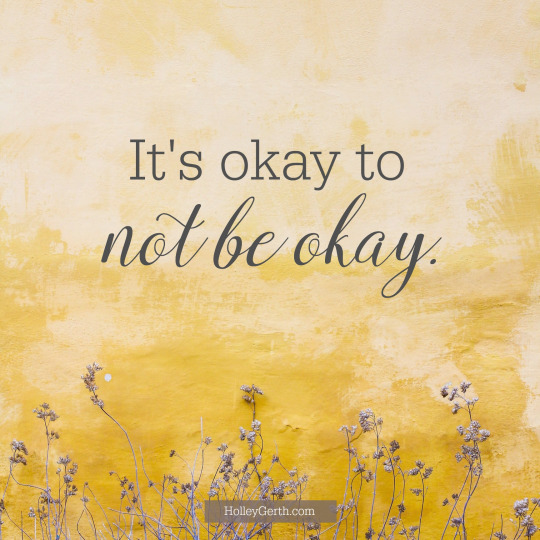
4. Do things that make you happy
This sounds really obvious but you’d be surprised how many people do things just because it’s what their families want or for their CV. Cut out the negative things in your life and stop doing things that make you unhappy. Find your passion in life. Find your joy in the simplest of things. No matter what age, you can always make a change.
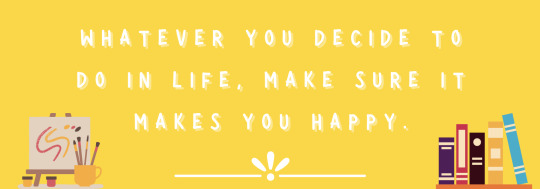
5. Don’t care
Of course I don’t mean ‘don’t care about anything’ because sometimes a little kindness and passion can go a long way, but what I mean is: when you were a child, did you ever care if you sang out of tune? As a child, did you ever care about how you looked? As a child, did you ever care that you weren’t the world’s best dancer? Be that child again. Try out new things even if you think you’re going to suck at them! Be a bit silly, embarrass yourself, have fun, and surround yourself with people that support you.

6. Self-reflection
This one kind of leads into Point 7, and is about looking within. Think about what has happened in your day and how you can learn from it and turn it into a positive experience. Try to find memories and feelings you can draw strength and joy from and save them for whenever you’re feeling a bit down. Self-reflection also consists of looking at the bad, whether it be changing your own ways, cutting out people or things that continually hurt you or bring you down, and think about what you can do tomorrow to right the wrongs of today. Truly reflect on whether you’re just stumbling through life or enjoying it.
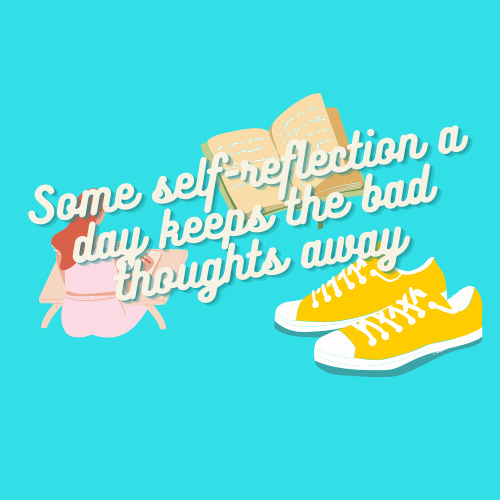
7. Journalling
Every time I have a bad day, I like to let it out onto the pages of my online journal. I like to transfer my thoughts out of my head and bring in a clean slate for tomorrow, otherwise I tend to get stuck in my head a bit. I also like to write down 3 things I’m grateful for, 2 things that make me happy, and 1 thing I want to do tomorrow. It sometimes helps to have a little bit of perspective and to see that there was some positive things about my day.
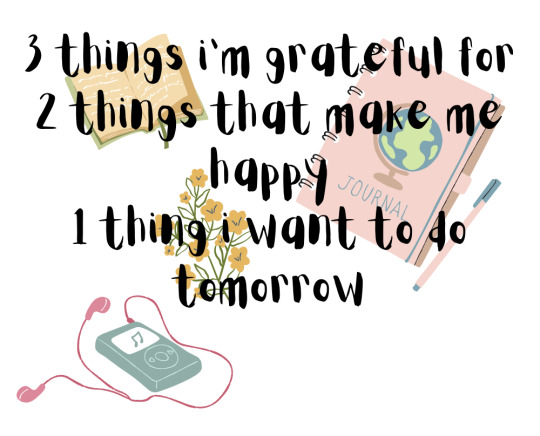
8. Don’t let a single bad moment make you forget all the progress you’ve made
It’s all too easy to get caught up on a bad grade or feel worthless in the wake of a bad day. One of the reasons I like journalling so much is that you get to reflect on all the progress you’ve made; you have physical evidence that you are the best version of you! Please remember: you are worth it, you are a good person, and you will get through this. Today might not be a win, but look at how much you’ve grown!
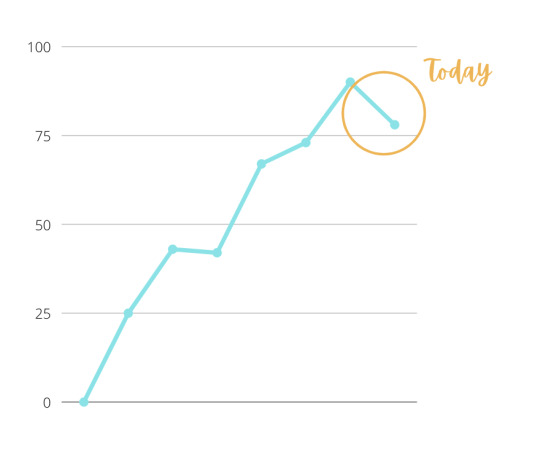
9. You don’t have to be perfect all the time!
PLEASE. PLEASE. PLEASE remember this. I don’t know how many times I need to say this, but I will for however long it takes for people to realise that you don’t have to smile and laugh and be happy all the time. Let it out. Be human. Feel pain and anger and sadness and emptiness. But when you’re done, look back and see how that experience could be beneficial to you going forward and how you can learn to balance the good and the bad.

10. Fake positivity is overrated
Being positive doesn’t have to invalidate your pain or trauma, minimise real issues, or mean there aren’t any problems. It is about looking at the bad things that are happening now in a constructive way and being determined to push forward for a better future.
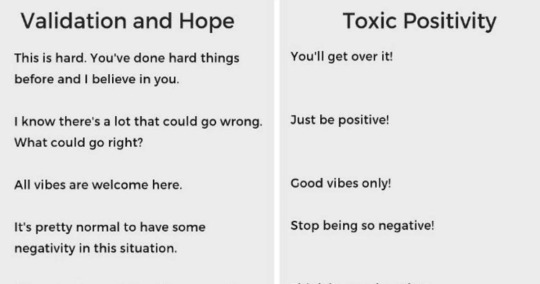
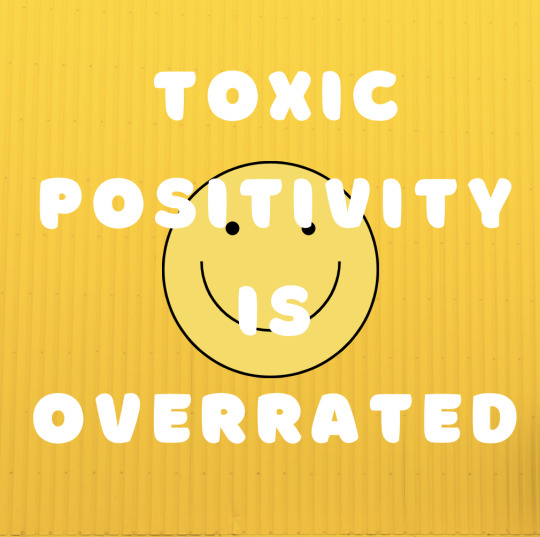
#look i'm not a professional#i'm not qualified to give any advice#this is just some things I like to focus on#human to human#positivity#positivethinking#positiveattitude#be kind#be kind to yourself#reflection#journalling#i know this is a science blog but sometimes this just needs to be said#help others#advice#be happy#rambling#ramblings#love u
8 notes
·
View notes
Text
It’s hard to leave your toxic friends... but it’s so worth it
I don’t normally do this, but as I sat in a Saturday morning meeting thinking about all of the things I felt this past Friday, I felt compelled to share my story.
A brief background: throughout college and for several years afterward, I considered my tight-knit group of college friends as some of my closest. In addition to my best friend of 20 years, some friends from high school, my work team, and some other dear friends scattered across the globe and throughout the U.S., this group of college friends was who I considered to be my foundation. This group of friends was extremely important to me, but it was not without its bumps in the road.
In my senior year of college, I had a falling out with one of these friends, the ringleader I’ll call her. I say this because she is quite honestly the source of 95% of my problems with this group. She is a master manipulator, and an expert gaslighter. There were a few others that contributed to this too, but she was by far the worst.
I can’t elaborate on every single thing that this person said and did over our 7 year “friendship” but a brief summary would be: asking me point blank if I thought I might be a lesbian after coming out as bi (to this friend group and in her presence, I might add) only several months prior; asking me how much money I spend on books about “Chernobyl” every month with the implication that she’s concerned about my finances; telling me that my resume may not be as impressive as I think it is (I’m the deputy director of a nonprofit with both state-based and national projects and had been for close to a year prior to this conversation); would clean up the crumbs from in front of me while I was still eating and comment on my messiness; told me that one of our mutual friends doesn’t like discussing politics with me because I get too fired up (again, I work for a nonprofit that deals with social justice); telling me that crying while comforting my friend who had just lost a loved one to suicide after they began crying was weird and that I “stole her thunder” (we were slightly drunk, I’m an empath, and she was talking about some deeply personal things that moved me and crying was my natural response... and oddly, she was appreciative of my tears because I was “the only person that actually stayed with her”); and so much more that I know I’m forgetting.
There were many other things more insidious, including gaslighting me about my inclusion in several group activities and why it should have been obvious why one friend disliked me enough to not invite me to her wedding after years of claiming cluelessness.
In our senior year, I left that friend for the first time after she humiliated me at a party by commenting loudly and with condescension on my weight. When I cut ties with her, I felt as if I had just left an abusive relationship, and for a while I didn’t want to seek a friendship with her again.
But the other friends in our group still hung out with both of us, so eventually I allowed myself to be sucked back in.
In the years after we graduated, I thought that this person had actually changed- I worked abroad for a year after college, and after returning I saw a marked difference in her demeanor and how she interacted with us. She seemed more self-aware of how her words and actions adversely affected other people, and I thought that maybe the ugliness of that horrible portion of my senior year was now just a faded scar.
But then things escalated very quickly. Over the course of several weeks at the beginning of this year, I started to feel myself questioning whether I had made the right choice in rejoining the group: I was so sure of how I felt after I left it the first time, I felt so empowered and free. So why did I allow myself to rejoin them? Was it really the right choice?
I got my answer a week after the insurrection at the Capitol. One friend who already had a history of saying hateful things about women (which I tried to put a stop to to no avail) finally went full white supremacist asshole, and instead of joining me in calling his comments unacceptable and defending me as he mansplained my job to me, the ringleader criticized me and told me that “I can work in activism and politics and be wrong”.
That’s the moment I finally woke up.
I left the chat that very moment. Every time they added me back without my consent, I left again.
Every time I got message from the ringleader that was full of gaslighting comments and false apologies, I didn’t say a word. Just deleted the message. Finally, I was able to gather the strength needed to block those toxic friends from all social media and my phone. One of these friends was someone I tried to make like me for years after I was told that she hated me for no reason, by her own admission.
Some may not agree with this approach, but I made the choice to cut contact and go radio silent on my own after consulting my friends, specifically my best friend who had been there for me during the incident my senior year.
As weeks went by, some of the true friends from that group reached out, and then immediately backed off after my polite request for space, indicating that I was welcome back at any time and they were always here for me.
The ringleader chose the opposite approach. She continued to gaslight me, made a group chat with myself, the white supremacist, and herself. She sent me messages from her second account, one that I remembered to unfriend but forgot to block. She told me that if I don’t “course correct” by a certain date she would block me on my account (too late, bro) and that “we wish you all the best”. This implies that it was on behalf of the entire group, something I know three of them would never do. However, at this point, I have had to distance myself from all of those friends so as not to give the ringleader the attention she wants from me.
I lost over half of my closest friends over night. It felt like my skeleton had been torn from my body. I considered giving in several times and reaching out to them. But now, over a month later, I understand how necessary it was to excise what was essentially a malignant tumor. The Chernobyl researcher in me wants to compare it to Acute Radiation Syndrome (ARS): an unseen poison that slowly infiltrates every part of your mind and body and rots them from the inside out.
2020 was an extremely hard year for me, as it was for so many. I am so lucky and privileged to have been in the financial situation that I was and had the support of my genuine friends and family.
But it was still the worst year of my life. I have suffered from pretty bad OCD for most of my life, and while I usually keep it under control, last year it became nearly impossible to do so. I also fell very deeply into clinical depression, and worked to the point of burn out and exhaustion. The primary thoughts I had during this depression were:
“Why aren’t you working? You’re lazy.”
“You’re a failure, you’re 26 and haven’t applied to grad school yet.”
“You piece of shit, still living with your parents? What a disappointment.”
“What is wrong with you?”
It was unbearable. I’m honestly not entirely sure how I survived it, but I think a certain 3-year-old goddaughter of mine and a few close, real friends had something to do with it.
I worked very hard with my friends, a therapist, and a psychiatrist to overcome this depression and get my OCD back under control. Now, I feel like such a weight has been lifted off of my shoulders. I still have depression, and the OCD will always be with me (like a bad habit... literally?); but I am so much more happy with myself and my life, as I should be.
And I am very, very, very well aware that therapy was not the only reason I have recently begun feeling this way. It’s very hard to see that you’re being manipulated while it’s happening. Because of my trusting nature, sometimes manipulative comments would be interpreted as heartfelt guidance.
It wasn’t until I started the journey away from them that I saw just how much this group and their negativity (because even the best of them weren’t always the kindest) impacted my mental health.
The event that made me want to share this story is this: yesterday was a rough work day. As a full-time community organizer, I am pretty much burnt out all of the time. Breaks are taken, but with projects addressing issues from COVID relief to systemic racism and police brutality, it never feels like enough.
I had to officially take a step back as a sole lead on an annual event that I organized for two years, and it was gut-wrenching.
Now, I cry often, but I don’t usually get to have therapeutic cries. You know what I mean? Like, as you cry, all of the tension that built up in your body by negative feelings is finally being released with every breath and sob?
Well, the dam finally broke in a team meeting on Friday. I started sobbing and couldn’t stop. And my colleagues were so, so kind. They let me vent, they let me cry, they would not accept my apologies for crying. They told me that I was strong for setting up boundaries, and that they were here for me.
We spent a lot of time at the end of the meeting each talking about our self-care routines. And as I sit here typing this, I am actively trying not to cry at the purity of their support.
This experience has taught me what real friends are. Real friends do not put limitations on your emotions and fears.
Real friends do not give you deadlines for processing your feelings.
Real friends do not criticize you for things that, while they may not agree with, do not affect anyone’s health or marginalize anyone.
Real friends don’t marginalize vulnerable communities.
Real friends help and support you with constructive criticism (when it’s asked for) and love, not patronization and manipulation.
I thought I knew all of these things before, but I know now that I am still learning... and that that is perfectly okay. I don’t regret most of the times we shared together. I am appreciative of the positive memories that their friendships gave me.
Three of the friends in this group are actually good people, and maybe one day when the dust is settled I’ll reach out to them and establish one-on-one friendships with them (if they want to).
And I have to thank my real friends, including @tryingtobealwaystrying, for all saying the exact same thing: you deserve so much happiness and fuck all of those guys.
So, the point of this post is to tell everyone this: you can leave your toxic friends. It’s incredibly difficult, stressful, and honestly traumatizing. And there’s no shame in needing time or feeling unable to leave those friends now. There’s also no shame in returning to those friends.
But please know, from this nerd to the reader: anyone that makes you feel any less than the beautiful, amazing human being you are and doesn’t want to help you become an even better human on your own terms is not a true friend. They don’t deserve you or the light you can bring into their lives.
And every agonizing step away from those friends is a step closer to a happier, healthier life.
7 notes
·
View notes
Text

Ahhh I have a lot of messages in my inbox right now (over like ...2000; ) but this one just jumped out at me from yesterday and I’ve been thinking about it a lot. I’m sorry if this is a long long response (l’ll screenshot it as a textpost so it doesn’t clog someones feed) but I just, with how hypercritical social media makes us about ourselves and others its important to acknowledge bullying and how exposed we are to it. If anyone reading this is also struggling with this topic right now please read below. Remember I’m not a licensed therapist but I’ve had a lot of experience with bullying so read below if you like-
For the most part, the big two are finding a positive support network and focusing on things that make me happy. I’m not unscathed, I have clinically diagnosed MDD, Anxiety, and PSTD, but I’ve learned to manage these things. If you need to take a break from social media, do it- do your best to be your own curator of positivity. If social media is one of your few solaces, create a special account for yourself that just follows what you love. Remember that YOU are the one in control of your social media feed and are responsible for what you see.
1. Support Network:
Find a group that you can trust, and do you best to talk about your feelings and experiences in a constructive way(see no 5). That being said respect your support network, always ask if it’s ok to vent to them and don’t treat others as emotional dumping grounds. I know trusting people is incredibly hard, I still struggle with it (my own support network is literally two people but I also practice a lot of behavioral therapy since a lot of medications unfortunately don’t work for me) but you can not go through life second guessing every action (fuck you, anxiety). If your situation is such that you don’t think you have friends you can talk to, your college might have a therapist you can talk to for free. There are also online sites and hotlines that offer the same free services. Sometimes it takes a few therapists to find one that works for you, but sometimes its easier to talk to a friend rather a stranger- and therapy might not always be available to everyone. Google is your friend for finding constructive options.I know it’s hypocritical since this is a tumblr post, but do research on your own from reputable sites and sources for healthy coping.
2. Don’t bottle it up: I used to be incredibly quiet about any sort of stress or bullying I received in the past. I used to lie about never being bullied or harassed after middle school, but the only person that ended up hurting is myself. I don’t think I’ll ever be perfectly fine, but talking about it helps more than you think. I’m not saying to blast it out to everyone exactly how you’re feeling 24/7 but take time to trade woes with a close friend every week or so. Just don’t forget to celebrate the good when and where you can- this world has so much that makes it suck, but there’s also a lot that we can enjoy- too.
3. Bullies seriously suck, but don’t become one:
In my experience, very few bullies ‘grow up’ if they’re still bullying people in college, they just kinda get better at hiding it. This usually manifests behind passive aggressive comments, and or just talking behind someones back and hiding behind a screen to say things. Even in grad school I’ve witnessed "adults” being shitty to each other twitter, on insta, on discord, on tumblr, on A03- you name it. Bullies can come from anywhere, and be anyone, and bully for any reason. People who were bullied sometimes become bullies themselves in a way to gain back sense of power- but their own abuse doesn’t make abusing others right. In the past I’ve had comments and emails telling me everything from childish bullying to literally telling me to kill myself. Negative comments about my appearance, the way I talk, the way I draw, my hobbies,my choice of schooling (which ??????), harassment about my choice of friends and the people I associate myself with. People who seek negativity will find any reason to slight another. But know that harassment is harassment regardless of why, so even if you’re angry bullying someone back really wont change much. I can think of nothing more toxic than willingly engaging with your bullies in order to find ways to ‘get back’ at them. The beauty of being online is that you can just leave a site, hit a block button, and even make a new name for yourself. Do your best to limit interaction with them. Do not put yourself in situations that involve them. Do not cyber stalk them (yes, repeatedly checking their tumblr/fb/instagram to criticize and mock their every post, or find every person they talk to “whistle-blow” on them is a form of defamation of character and cyber-stalking). Doing this will only invite negative emotions and make you start to hyper fixate. It’s an easy two way street that will invite people to do the same to you- and unless you’re the next coming of Christ someone will inevitably find out something negative about you. Do not hold people to standards that you yourself cannot achieve. You may be more morally inclined than your bully but no one one is perfect. You will never be able to please everyone. It is not your job to do so.
4. Report, Put Away, Ignore: If these people are saying things to you that can be documented and reported to your school (assuming these are classmates that you can prove have done things) then take a screenshot if possible and report it. It’s a gamble to have anything done about it, some schools are shit about bullying, but some schools aren’t. Recently in my case, in grad school there was a bullying incident and we were incredibly afraid of what the bullies would do if they found out who exactly reported them, but thankfully I had friends help us report it- so multiple reports from anonymous sources made it hard for them to pin point it was someone finally standing up. Some colleges will take defamation of character (which, as an adult, is really what a lot of bullying is) very seriously and amazingly- that bully completely changed. I would not call them a friend, but for now their apology seems sincere and they’ve worked towards being a better person. So, if you choose to report it, after reporting, put that shit away and don’t keep looking at it, find a way to make it really hard to look at over and over. Put it in a folder within a folder within seven folders if you have to BECAUSE- 5. You HAVE to work towards moving ON or it will consume you.
Way, way easier said than done. I’m not saying so much ‘be the better person’ as to just ...seriously remove yourself from that shit as fast as you can. You owe nothing to the people that hurt you, but giving them more of your time over and over if you have the option not to is only going to end in you getting angrier or more upset yourself. The first time something hurts you, put a warning label on it, if it continues to hurt you, do not engage.
The internet can be so toxic- a lot of bullying is masked as “call-out culture” from minor things that happened years ago, it validates the worst forms of “coping” possible. It creates such a bad system of alarm fatigue for when real issues are happening, and creates a hive mind of abuse and hyper criticism where everyone is looking for the next target. There’s an extreme difference if a “bully” disagrees with your favorite ship or show and harasses you about it, or if someone is literally harassing you as an individual by telling you to self harm or worse. Treat your emotional scars like an actual wound; if you keep picking at it and ripping off the band aid to see if its still there its never going to heal. The scars might still be there and will still be visible on some days, but you’ll no longer be bleeding at the slightest brush. Learn to grow, learn to let others grow. Learn to trust again, and learn to try and be happy with who you are and who your friends are as you know them. A big reason why I stepped away form the internet is that I found myself looking to validation in terms of popularity. And when i finally had it- I realized how toxic it ended up being for my health. I’d spend hours just to make a comic even at the cost of sleep or food, and 100 positive comments couldn’t stop my brain from fixating on ten that were negative or downright harassment. Even as I step back on the internet, I’m doing it from a much better place internally. It’s so so important not to get lost in numbers and online “validation.” Please just know eventually things will get better, and those that matter will stick around to be there to see your growth. People will always find something to give you shit about, but only you can determine how much it affects you. Recognize your emotions, process them, and take responsibility for them. Let your self-worth be determined by your own actions and words, not the actions or words of others.
59 notes
·
View notes
Text
If There’s a Place I Could Be - Chapter Thirty Four
If There’s a Place I Could Be Tag
July 4th, 1998
Emile watched the scene unfold in front of him in slow motion. Faith had told one of the bullies that she wasn’t going to take anything else they wanted to dish out, and the guy pushed her backwards. She stumbled back a step, but rushed forward, pushing back just as hard, and the bully staggered backwards two steps. He turned red, bringing his fist back to swing.
Faith reacted quickly, bringing her shin up to the guy’s crotch. Emile couldn’t even step in to try and break it up, he was in so much shock. He felt so utterly powerless. Not only to help, but to stop the fight from happening in the first place.
May 26th, 2001
Emile felt completely powerless. There he was, five feet away from his boyfriend who was in the middle of a panic attack, and Remy’s mother, the bitch, was trying to get Remy to come with her. Emile wanted to move forward, to comfort Remy, to change his mind, but his feet felt glued to the asphalt he was standing on. He felt like he might cry, or like his heart might shatter and he would never recover.
Remy was looking at his mom with a mix of fear and hope, like she could somehow save him or wave away all his trauma. The blood roared in Emile’s ears as slowly Remy stood on shaky legs, and hugged his mother. She walked over to Emile, and Emile just stood there, looking her over. She frowned at him. “I need to get Remington’s things,” she informed him.
“And clearly I need to get off this bad acid trip,” Emile said. “Because I’ve never known Remy to hug people he’s afraid of before. Ever.”
“Remy isn’t afraid of me,” Remy’s mother scoffed. “If anything, he’s learning where he fits in the family. It took him long enough, but he’s coming around.”
It was Emile’s turn to scoff. “Right. Because he would clearly tell you how he feels about you if it was anything remotely negative. Of course. There would be no backlash for that, I’m sure.”
“Of course not, I encourage all my kids to be honest with me,” Remy’s mother said.
“Bullshit,” Emile growled. “I bet the second they come to you with a problem you either make it their fault for not doing what you wanted them to do, or you guilt trip them into taking whatever they said back. Remy, how close am I?”
Remy was shaking and glaring at Emile. “Let it go, Emile,” Remy warned.
“You know me, Rem. I never let anything go until I feel like it’s been fixed. And this is not a solution. At best, it’s a band-aid over a bullet wound,” Emile said.
Remy’s mother tried to forcibly move Emile to the side, but Emile just stood in place, a smile slowly growing on his face. “You’re not getting Remy’s things, not if I have a say in it,” Emile said.
“You don’t have a say in it,” Remy’s mother snarled.
“Don’t I?” Emile asked.
“You don’t,” Remy said, voice sharp and angry. “Let it go, Emile. Let me go.”
“No,” Emile said. “Even if you leave with your mother, I will never stop thinking about you. I’ll never stop trying to write, to find you, to show you that I love you. I love you more than anything else in the world, Rem. And whether or not we’re just friends, or something more, we’ll always have a certain connection between us. And I, for one, am not willing to give that up.”
Remy’s mother sneered at him. “You’re going to burn in Hell,” she informed him.
“Hell will be fabulous, covered in glitter, and I’ll have any guy I could possibly want,” Emile replied without missing a beat. “Although, considering I’m Catholic, you know, I might actually be going to Heaven. I don’t think just being gay will land you in Hell. Purgatory, maybe. Maybe I’ll spend a little longer in Purgatory than I would have otherwise, but you know what? That’s completely worth it.”
“Emile,” Remy said. “Please, stop.”
“Why should I?” Emile challenged.
“Because I asked you to,” Remy said. “I’m not comfortable in this situation. I’m calling it.”
Remy’s mother turned to Remy. “Since when do you talk about your feelings?” she asked. “That sort of thing is completely unnecessary.”
“Wow, I see where he gets that from,” Emile muttered.
“What?” Remy’s mother asked, turning back to Emile. “What is that supposed to mean?!”
“Oh, nothing, nothing,” Emile said with a wave of his hand. “After all, I’ll respect Remy’s decision to not want to talk about it.”
“You’ll tell me what that meant, right now!” Remy’s mother demanded.
An idea formed in Emile’s mind and he widened his eyes with false innocence. “But ma’am, if I did that, I’d be considering you more important than Remy.”
“Remington answers to me,” Remy’s mother spat. “He listens to what I and his father have to say, and he can make his own choices once he’s listened to what we want him to do. He’s free to do whatever he wants, so long as it’s within our plans for him.”
“And there it is,” Emile said, feeling completely vindicated. “Remy is a second-class citizen in your eyes. You come first, and he comes second. Maybe third, or fourth, depending on what his siblings say, isn’t that right?”
“Children are to listen to their parents,” Remy’s mother growled.
“Yeah, when they’re twelve,” Emile said. “Remy is, to use his own words, a ‘grown-ass man.’ He’s old enough to make his own choices about his life, and you’re stripping that right from him. Children have to listen to their parents when they are still children, because their parents generally keep them from doing something stupid that would hurt the kids. But once that child is eighteen, they’re a legal adult, and they’re allowed—no, they’re encouraged to make their own decisions. If Remy makes the choice to go back to you, that’s his choice. But if you strip him of his ability to make his own choices, then you are the one in the wrong.”
“And yet you were trying to take away my choice earlier by saying I couldn’t go back to my mom and dad,” Remy said. “You’re a hypocrite.”
“Yeah? Well, at least I’ll admit to my mistakes, unlike someone in this parking lot,” Emile said, glowering at Remy’s mother.
“When did you admit you were wrong?” Remy scoffed.
Emile looked at Remy. “Every time I’ve yelled, or moved too fast, or made a sudden noise that scared you. When I tried to figure out the logistics of getting a giant sofa into the apartment and you informed me it would never fit through the door.”
“But not when it comes to my family,” Remy said. “You never say you’re wrong when it comes to my family.”
“I’m...not wrong when it comes to your family,” Emile said.
Remy made an offended noise. “You’re not even open to constructive criticism when it comes to your opinions on...virtually anything. Especially cartoons and my family, though.”
“Well, you hardly give evidence to support your claim that your family isn’t as bad as you claim, and you just get mean when you insult cartoons,” Emile said, crossing his arms. “And no, providing you with food and shelter doesn’t mean that your parents were good. That’s a requirement of being a parent. Not something optional you get when you behave, or because your parents feel ‘generous.’”
Remy’s mother snarled, “Move out of the way so I can get my son’s things and we can leave!”
Emile stared down his nose at Remy’s mother. “Ma’am, I say this with as much respect as I can muster, but go to Hell.”
“Emile!” Mom snapped at him. “You can’t say that to anyone!”
“Well, what am I supposed to say?!” Emile asked. “Should I give her a customer service smile and let her hurt Remy?!”
“Once again, you’re hurting me more than she ever has!” Remy exclaimed.
Remy’s mother turned, shocked, to Remy. “You don’t genuinely believe I’ve hurt you?”
“Wha—no! That’s the point!” Remy said, but Emile could see Remy’s tells, and he was definitely lying. And his surprise meant that he wasn’t doing it as well as he usually did. “You haven’t hurt me at all, and he’s hurt me plenty of times!”
“You know I can tell when you’re lying, Remington?” Remy’s mother said. “You’ve always had the exact same face when you lie, from back when you were four years old to now.”
“Okay, so maybe you’ve made me feel bad once or twice, but—”
“When?!” his mother asked. “When have I hurt you?!”
Remy looked like a deer in headlights. “At the coffee shop?” he said. “You scared me out of my wits. And at Thanksgiving, trying to get me to change my major—”
His mother cut him off again. “I was helping you!”
“No, mom. You weren’t,” Remy said, before clapping a hand over his mouth.
His mother was eerily still, and Emile knew that whatever happened next was going to get ugly. “Oh, I see,” she said. “I’m the villain, here. After all these years, you’re still ungrateful for everything I’ve done for you. I made sure you were happy, and that you would fit in with others your age! All those times you were upset when I might take some childish thing away from you, it only took you the next day to recover and it was like nothing ever happened! Do you want to be like your ‘friend’ here and be stuck in the past, watching children’s shows for the rest of your life? I was so relieved when you outgrew your comics phase. You would never have had friends if you had kept that up.”
Emile was ready to strangle Remy’s mother. Not even over insulting his love of cartoons, but for her blatant disregard of Remy’s feelings. It was completely unfair and cruel. Remy removed his hand from his mouth, but his eyes were glassy.
His mother scoffed. “Crocodile tears don’t work on me, Remington, and besides, no one likes a crybaby. They’ll train that out of you in the military.”
Remy was shaking all over, and he muttered, “So that’s where I am. A rock and a hard place. Fantastic.”
“Why are you even entertaining these people?” his mother asked. “We can get you new clothes, you don’t need anything in that suitcase of yours, anyway. Let’s go.”
Remy didn’t move.
“Remington,” his mother prompted. “We’re leaving.”
“I thought...” Remy cleared his throat. “I thought you said you’d be proud of me. Well, I’m doing what you wanted. Why are you still treating me the same as always?”
His mother scoffed. “You don’t get special treatment over your brother or sister. This is the way your father and I treat them, and so it’s how we treat you. Just because you make us proud doesn’t mean your place in this family moves.”
Remy blinked repeatedly. “But...but you always treated me like I was a problem child. If I listen to you, I’m not a problem anymore. I get my own spot at the table when we make decisions.”
“Remy, you clearly don’t know what’s best for you on your own. I’m glad you came to your senses and decided to listen to me, but you can’t be trusted to know what’s best for you. Toby and Vanessa barely know what’s best for themselves, after all these years. They get their opinions considered, but you have to work a while before you get to that point,” his mother explained.
Emile stayed silent, and didn’t move, even though he wanted nothing more than to kill Remy’s mom then and there. Remy was staring at her with hurt, and shock, and betrayal. “Even if you’re proud of me...you get the final say in my life? That’s what you’re saying?”
“Yes, you’re finally beginning to understand!” Remy’s mother exclaimed.
Remy looked down, before looking back up, saying, “No, Mom, I don’t understand. I don’t understand why you get the final say in my life.”
“Because I know you best!” his mother exclaimed.
Remy laughed. “Mom, you don’t even know that I can cook. You set me in front of the stove and said I was old enough to make my own food, and I found I had a knack for making meals, but you never once thought to ask how it was going. If you ever saw me eating something I made you accused me of ordering take-out, because there was no way I’d be able to make something like that, of course. You don’t know me. At all, I’d say. Why should you get to control my life when you don’t even know me?”
“Remington, don’t you dare backtalk,” his mother said.
Remy bit his tongue, pulling a face. “Yeah. No,” he said. “Misses Thomas, I’m sorry for having you drive me all the way out here. Clearly, this was a mistake.”
Emile’s heart soared with hope. “Does this mean you’re staying with us?”
“It means we’ll be having a very. Long. Talk,” Remy warned. “But if I’m not going to be respected at home, then I’m not going home. Sorry, Mom.”
4 notes
·
View notes
Text
So... doing my best to speak from my own experience only, I just want to give an example of how identities are constructed categories and why it's not always sensible to assume that standardizing a definition clarifies things or makes them easier.
When I first came out and had contact with The Community, I was in my late teens and it was the early 1990s. So my language and my thinking came from people I considered experts, or at least more experienced, and that mainly meant people whose sense of themselves was forged post-Stonewall and in the heat of the AIDS crisis and, in situations where women predominated, through interaction (positive and negative) with second-wave feminism.
And I didn't have cause to analyze it at the time, because it was water to the fish, but the way we used terms about identity had everything to do at that time with one's commitment, if you will -- to say you were gay, to say you were a lesbian, to say you were here and queer, was perceived as a kind of pledge of loyalty, like a religious conversion. It meant that you were (even if you had to be closeted some of the time) removing yourself to whatever degree possible from the comfortable privileges of full participation in Straightlandia, and instead saying I don't belong with them, I'm coming with you now.
So in a way that I'm sure seems weird to people who never experienced it, there was really no interest in auditing someone's sexual history or the contents of their inner world in order to vet them. You could have slept with 700 men and married five of them, but if you said you were a lesbian now, you just kind of were, because that wasn't seen as a statement about your past, but about your future behavior. You had "changed teams," and everybody just kind of groked that and didn't question it.
I think when you understand that, it's easier to understand certain other things, like where a lot if intra-community biphobia comes from. Because self-identifying as bisexual was conflated with refusing to join the team, with lack of commitment. When your sexual identity isn't really built out of the sum of your thoughts and actions, but out of your promise to stay and share your life experiences with others like you -- insisting that you were bisexual (and I say this as someone who is! and did!) sounds like "idk, man, we'll see."
This expectation that belonging to the community meant surrendering Straightlandia, and that bisexuals were choosing not to choose, did help create the tight container of mutual aid that helped the queer community survive the rocky decades of learning how to exist visibly while half of us were actively dying, but it wasn't actually great for bisexual people, or at least for those of us who did feel committed and did want to be clear that we were in it for the long haul. It was tough to navigate with the language and the ideas we were given, and what very frequently happened is that we just kind of... got old enough to start pairing up, and we started using the language of whatever group we'd thrown in our future fortunes with.
So you'd have women who say they're straight, who think and feel straight, but if you get them talking, they'll tell you they dated women at one point, and actually their first heartbreak was this girl in high school, or whatever. But that's the past to them; it doesn't bear on what they see in their future, so it's not how they identify now. Or you have women who've been in lesbian relationships for ages, who are perceived by their neighbors and co-workers and family and friends as lesbians, who just kind of -- stopped relating to their younger bisexual selves and started perceiving themselves as gay. Because that's how we learned it, you know? Your queerness is about settling in where you belong, life-wise, and then that life forms your felt identity.
And now it's very different. Now the expectation is that you begin internally, by analyzing your subjective feelings, and you identify them: you feel this way sexually about women, this way romantically about men, this way about the genderfluid, all these infinite shades of perception and reaction. You locate the word that most accurately describes the shape of your experiences as a whole, and that's your identity, the thing you feel most like. And then that felt identity shapes whether or not you belong to the community, whether you "get to" go to Pride or whatever (I assure you, in the 90s it never occurred to us that straight people would perceive attending Pride events as a treat we were withholding from them).
(By the way, I'm framing this as generational because I think it is to some degree, but there's no such thing as a monoculture, and even in the US, which is what I'm describing, there are still parts of the community, particularly in conservative locations and I think particularly in mostly male communities, where the dominant understanding of identity still is this "older" model of loyalty-first, of disinterest in the details of your past so long as you have your teammates' backs.)
And I think -- on balance, it's an improvement. Letting people just be bisexual their whole lives long is way better for a lot of reasons, and has additionally been good for the community -- it might challenge some people to relate to the heterosexually-paired as Teammates, but keeping the energy and wisdom of people who were once expected to retire their gay gun and badge has added to our numbers and diversity.
It does mean that there's a certain culture now of trying to force people to match their experiences to The Correct Definitions, and I notice a depressing number of people questioning others, or even worse themselves, over whether they really qualify as X based on things they've said or done before. That looks ugly to me, and it makes me long for the days of being able to say, whatever, the past is the past, let them focus on who they're going to be going forward.
But then, our pasts really don't disappear, and I don't miss back when people were kind of expected to pretend that the person they were and the people they loved at 24 stop counting for anything at some point. Life is complicated, life is a flow of constant changes, but we should get to keep our pasts. They're ours. And of course, even if you've never loved anyone at all, you can experience your mind and heart as queer (or as whatever other word feels good to you) -- I think that's a powerful insight that would have been entirely alien to me 25 years ago, but it's true.
Anyway, I think what I'm saying is that life is not an infographic, and people fit words to their life stories not according to strict and objective dictionary definitions, but based on social and ideological factors that construct the categories we move inside. And people who use words in ways that don't make sense to you are maybe coming from a whole worldview that's opaque to you, and maybe learning who they are is key.
(This is not a post about why it's okay to say that Eliot Waugh is gay even though he's been known to enjoy sex with women, but it could be? Like, if that's what you get out of it, you're not wrong.)
24 notes
·
View notes
Note
It's really ironic for you of all people to reblog a post about being close with friends. It really is. The same person who blocked me out when I even said I was slightly upset or happy or feeling any emotions to anything, simply because 'sorry, I'm dealing with a lot :((((('. Once I said that I liked a song and then suddenly I had to not talk to you about anything that was even slightly negative, and I still don't know why, to this day. And that was months ago. You are the opposite of a friend that anyone can be close with, especially the opposite of what a friend is. But you'll probably just send this ask to your friends saying '!!!! Look!! Someone said that I impacted them negatively before, and I can't accept criticism, and think that I'm more important to the world than the sun!! ówò :((((( 😢' and then suddenly they'll all go rushing to your defense.
Anyways, hope you become less of a toxic sack of shit soon
Yeah, I guess so... ironic.
Okay, so that is one reason.
I'm genuinely sorry about that. Scrolling through our past messages (I think I can pinpoint who this is, but I'm still like not 100% sure because literally anyone could be behind the anon mask and I don't want to like target the wrong person), I think I'm starting to remember some times where I would have to take some time, not block!.... Maybe I missed some things, so feel free to refresh my memory.
My reasoning was valid at that time, I was dealing with some problems of my own and I wanted to take some time so that my reaction to your problems and emotions wouldn't be clouded or biased and I wanted to be able to give my full to being there for you as a friend without making my responses seem distracted or half-assed. I'm sorry I couldn't be that person.
And I don't remember ever blocking anyone out when they are happy or feeling any other emotions to anything. Like genuinely. So I'm really really shucking sorry if I did. Any reasoning behind that is honestly probably going to be the crappiest and I don't even know what is going on for me to act like an asshole.
About the song... I- know this might sound like an asshole thing to say, but I genuinely don't remember???
What??? You said you liked a song, and then you're not allowed to talk about anything that was slightly negative??? Okay like, I'm just thinking if this even seems like something I would do, like surely not. And like it doesn't seem like a possible happening??? /gen /nm /justreallyreallyconfused
You are always allowed to talk.... okay... I'm remembering something but the memory is a bit blurry. Is it on Tumblr or Discord? I think that'd help. But you should always be allowed to talk about literally anything, I wouldn't have minded if it was positive, neutral, negative, vents, angst, rants, or anything. And I'm sorry if I made you feel that way. I also don't know why if that happens, why or how it happens because a song should not lead to that conversation?
And see, you say this was months ago. And I know it's bold of me to say anything when you're the one that's hurt but the only problem I have with this whole situation is that - like you said it was months ago! So if you had any problem with me, with how I acted, treated you, you could have said them right to my face! Or brought up anytime during conversations /lu
Like I genuinely wouldn't mind and I'd rather be called out for it and to learn how to avoid it. But the fact that you acted no different, or even showed any signs of uncomfiness (But, I am clueless, so I may be missing them), and the fact you didn't say anything about the things you're saying now made me think nothing was wrong /des
Yes, I know I haven't really been a great friend. I've had my fair share of falling out and I know how stupid and ridiculous it makes me look. Pfft, can't even be a good friend so does that make me a good person? I don't know, but I want to change that.
I guess you do know me pretty well then. I spent nights trying to "read between the lines" using really limited context clues to even figure out what that ask even meant. I wanted to know what I did wrong so I could apologize for them and leave you be. I don't like leaving things half-finished, especially friendships and relationships. But no, I can accept criticism. As long as it is constructive and within the reasons of logic and contains reason. The asks you've sent me are 80% accusations that are only half correct and 20% actual reasons. But then again you don't really owe me any explanation because you expected me to know what you're trying to say but I'll tell you, I'm like what you said - The fricking most clueless bitxh around. So make of that what you will.
I don't need friends to rush in my defense. I like fighting my own battles and owning up to my own mistakes. So here's my formal apology to you:
I am incredibly, genuinely sorry. From the bottom of my heart. I would like to apologize for any wrongdoings I've caused you, for the time you've wasted spending all those days and nights talking to me, for being a clueless sack of poop that can't see how bad I've been treating you. And I'm sorry you felt that you couldn't have just called me out for my toxicity and bullshittery directly in a way that is clear. I would like to make it clear now that I would not have and will never be mad for things like that.
And yeah, it's up to you to accept this apology, I have no rights to force anything on you, and I will leave you be
To be frank, if this is how you want to end things then I guess I'll see you around the other side. Wishing you and your fam well and stay safe wherever you are :)
If you feel like I need to apologize for anything else feel free to drop an ask. It's clear you deserve it and it's honestly the least I can do. /srs /gen /nm
Hope I learn better moving forward, thanks for the wishes. I hope I stop being accidental toxic in the future.
#forgive-and-forget#/gen#/srs#/nm#/lu#stands for a little upset#apparently that's what the caard says#/des is desperate#made that one coz I needed to get my point across#this entire thing is a mix of nm and lu#to the anon#I'm sorry for everything#like genuinely#I'm an easy kind of thing#by next week heck maybe tomorrow this would already be out of my mind#not to say that your complaints aren't worth mulling over#but I'm a represser#repress - forgive - forget#or i guess in a time like this I apologize#so apologize - repress - forget#this is now a personal rant thing#I need to learn how to apologize shorter#I always end up writing an entire essay#long post#anon stuff#hm.
1 note
·
View note
Text

I posted 205 times in 2021
75 posts created (37%)
130 posts reblogged (63%)
For every post I created, I reblogged 1.7 posts.
I added 192 tags in 2021
#self reblog - 71 posts
#tickle community - 26 posts
#tickling community - 21 posts
#ask - 19 posts
#tease for lees - 14 posts
#tickling - 13 posts
#january 2020 - 7 posts
#may 2020 - 7 posts
#february 2020 - 7 posts
#me - 7 posts
Longest Tag: 137 characters
#but this also got me thinking that i kind of want to find a boy with sensitive nipples like mine to see if they turn just as flustered...
My Top Posts in 2021
#5
Flexing my fingers above a particularly ticklish spot, getting closer…
Lee: “Stopppppp!”
Me: “Stop what? Stop teasing you? Ok, but this will be the last time I listen to your pleads”
Tickles you forever.
48 notes • Posted 2021-08-01 00:01:12 GMT
#4
Tips when playing with a Ler IRL
I was talking to a friend of mine the other day after they had a session with someone new that ended up being less than perfect. It inspired me to write up some thoughts and advice.
I’ve noticed that a lot of Tops/Lers can get a bit over-confident about their abilities and feel like they know best and need to take charge, especially around a shy play partner. This can definitely help to move the process along and make things happen, compared to two shy people who might take a long time to build up to play. But the downside is that they might not realize the responsibility that goes with this power, and if they only ever play with shy people they might never get called out on their bad behaviour and learn to be better. Lers: keep this in mind and solicit feedback to improve your skills and help your Lee feel safe and satisfied. Lees: it’s important to speak up about your feelings when you feel safe to do so. It might take some time to get your thoughts in order, so it’s perfectly valid to talk about things days later.
Tops/Lers might assume that what worked for one partner in the past will work for everyone they play with. This is very wrong lol. Everyone I’ve played with has been different and required a fairly lengthy learning process to figure out what worked best for them and how to make it a good experience for them. In my experience, the more you play with someone the better it gets as long as there is open communication before and after the session to discuss the good and bad so things can get better. Lers/Lees: see point 1.
The Ler might have a fantasy in mind for how they want the session to go and don’t really mind pushing your boundaries to get what they want. It’s important to watch for this type of thing because this can be very dangerous. Lers: I can’t stress this enough - make your Lee’s safety/pleasure/satisfaction your top priority. Everything will go so much better and it will greatly increase your chances of getting to play together again. Lees: be on the lookout for this unsafe behaviour and call it out or stay away.
Anyone (but the Lees in particular) might feel super shy during the session and find it difficult to provide feedback in the moment. This doesn’t mean that they now have to keep those feelings to themselves. You are allowed to learn new things about yourself and establish new boundaries and provide feedback on the session after reflecting on it afterwards. Lers: your lee might initially say the session went well but then come back with suggestions on how it could have gone better afterwards. Listen to them and understand that it sometimes takes a while to get their thoughts in order or to build up the courage to provide feedback. Your job is to build a safe place for them to discuss these things with you. Lees: I absolutely think you should send all of your thoughts and concerns to your Ler after the session. If they take your message as constructive feedback and learn to be better than that is a really good sign that they are someone you’d want to play with again. If they get defensive and act negatively then that’s a big red flag to stay away and don’t play with them again.
I’m personally always a bit more cautious when playing with someone who is 100% Ler. If they don’t know what it’s like to be a Lee then it’s extra important to stand up for the things that make a Lee feel safe - a good Ler with know these things but it’s never safe to assume.
And finally - age is no guarantee of ability. Tumblr has been an amazing resource to learn safe bdsm practices and enthusiastic consent, but it’s important to remember that the community on tumblr didn’t exist for the older generation while they were growing up. The online tickling community catered to Ler’s fantasies for most of its history, and still does in many places. Lers: be aware of your biases/blind spots and solicit feedback, invite the safeword, and be extra cautious when playing with a new play partner. Lees: don’t rely on your Ler to know all of this stuff. They absolutely should, but it’s unsafe to assume.
62 notes • Posted 2021-06-18 01:38:12 GMT
#3
Tickle Fight / Wrestling
So I’ve been brainstorming some ways to do an organized tickle fight/wrestling competition. I’d start by clearing some space in a carpeted area, or setting up some thick padded mats on the ground. Here are the rules:
Two competitors start kneeling down on either side of the play area
Two referees stand outside the play area to watch for anyone breaking the rules, and to judge the winner
A referee starts a 5 minute timer, and each competitor tries to pin and tickle their opponent for as long as possible. The winner is decided by the referees. It’s a bit subjective, but bonus points might be given for style, quality teases, longest pin, or any other criteria the referees decide.
No competitor is allowed to leave the ring until the timer is complete (or a safe word is called)
No competitor is allowed to stand up - only kneeling and crawling are allowed as movement. This is to discourage an overly defensive strategy of running away to avoid tickles. It’s also to avoid injury from a competitor attempting to bring you to the ground aggressively. (And it also keeps those sensitive soles exposed 😏)
No hitting, or deliberate attempt to cause pain to your opponent.
If either referee witnesses a rule being broken, both referees get to join in to gang up on the offender for 30 seconds of penalty tickles 😏
When the timer is done, the referees decide a winner and then both join in to give 1 minute of punishment tickles to whoever lost 😈
This opens up a few fun scenarios to imagine:
One of the competitors starts to lose pretty badly so they roll away in an attempt to escape. They accidentally let an arm fall outside the play area and the referees pounce on them to pull them back into the middle of the play area and commence the penalty tickles
The fight is without a clear winner, so each competitor waits in anticipation as the referees huddle together to discuss who won. The referees then walk back towards the competitors with big evil smirks on their faces and wiggling fingers outstretched towards the loser.
Or, there is in fact a clear winner and the winning competitor knows it even before the match is done. They have their opponent pinned and are whispering teases about how much worse it’s going to get once the timer runs out and the referees join in.
Or or or! The one competitor thinks they are the clear winner but then the referees decide based on some arbitrary criteria that they actually lost and proceeds to gang up on them anyways 😂
Who wants to play?
92 notes • Posted 2021-01-27 19:01:31 GMT
#2
Tickling is so funny because once I find a good spot, the person being tickled feels like it’s absolutely imperative that they get me to stop immediately. But it’s not! You’re fiiiine 😂 I’ll show you! I’ll keep going as long as I want 😈and when I’m done with you, you may be out of breath, you may want to curl up in a ball, but you’ll still be here! Ready for me to tickle you allllll over again the next time 🙂
118 notes • Posted 2021-04-25 14:39:28 GMT
#1
For People New to Tickling
So I’ve been attending some local munches lately and it’s been really cool. My home town has quite an active kink scene and it’s been interesting to meet some local kinksters even though they don’t share my tickle kink specifically. However, it has put me in the interesting position of having to explain what I’m into, and even though tickling isn’t for everyone I still feel motivated to explain it in a way that might cause someone who is hesitant about it to perhaps consider it as a fun, sensual, or erotic activity to participate in. And instead of being a stuttering mess when I try to explain in person for the first time, I thought I’d write some things down instead 😛
I love tickling. I love the intimacy of it, the playfulness, the silliness. I love laughter. I love building the close friendships and relationships that are required to make tickling fun. I love joking and play fighting. If you give me a cheeky comment I may need to tickle you. If I tell you a bad pun and you groan, I may need to find another way to make you laugh (while explaining the joke in detail to make sure you get it 😛). I love touch. I love giving massages with some sneaky soft tickles to light your nerve endings on fire. I love finding erogenous zones and stroking them softly. I love causing reactions. A squirm, a gasp, a shudder, a giggle.
And yes, I love a more intense side of tickling as well. I love the power play. I love feeling someone struggle to escape. I love hearing someone beg me to stop. I love the desperate laughter when I find a particularly sensitive spot. I love how it can seem like it’s absolutely imperative that you get me to stop immediately, but if I don’t you simply turn into a laughing, squirming, begging mess (unless a safe word is called of course). I love playing games with you. Especially ones you can’t win. I love telling you not to move or else it’s going to get a lot worse. I love tickling one spot until you beg me to tickle a more sensitive spot. I love building anticipation. I love hovering over you and making you flustered. I love describing all the mean things I’m going to do to you while you are stuck and can’t escape. I love putting a blindfold on you so you have no idea where I’m going to get you next. I love making you my tickle toy.
I love including tickling in more erotic play. I love alternating between sexual and tickly touches to keep you on edge. I love doing both at the same time to see if I get giggles or moans. I love using my tongue to explore which places tickle and which places turn you on. I love staying on a giggle spot until it turns into a moaning spot, because sometimes those lines are blurred. I love bringing you right to the edge with sexual touch before bringing you right back down with a tickly touch. I love making you frustrated and ache for release. And I love eventually giving it to you, but be careful what you wish for because everything is more sensitive after an orgasm 😈
And yes, I love all this from the receiving end as well.
Some additional thoughts:
I love playing with different people with different limits. I tried to break this post into logical categories with the first paragraph being friendly, flirty tickles, the second paragraph being BDSM style tickles, and the third paragraph being sexual tickles. Part of the negotiations with a new partner is finding out which style they’d prefer, and if there are specific activities in each category they’d want to try, or avoid completely.
122 notes • Posted 2021-09-06 14:10:21 GMT
Get your Tumblr 2021 Year in Review →
14 notes
·
View notes
Text
“Dad Sent Me to the Moon” vs. “Because Dad Made Me”
How Luther and Vanya Talk About Trauma, Part Ten
This is the final part of my series examining how Luther and Vanya address their own trauma, as well as the trauma of others. Here, I’ll share some thoughts I have after analyzing these two characters’ attitudes toward trauma, as well as some thoughts on fandom in general. If this is the first time you’re seeing it on your dash, you can catch up on previous installments here:
Part One Part Two Part Three Part Four Part Five Part Six Part Seven Part Eight Part Nine
Thank you to everyone who’s stuck with this series for so long. I know I haven’t responded to all of you personally because I’m lame, but trust me—your support and positive feedback has kept me going.
*********
Final Thoughts
Trauma Mentions Come Down to Quality, Not Quantity
Luther and Vanya are even when it comes to trauma mentions—11 each for addressing their own trauma, and 5 each for the trauma of others. However, in the first five episodes, nearly all of Luther’s mentions of his time on the Moon or his forcible mutation come when prompted by others. His early mentions of the Moon are neutral or positive, and he outright tells Allison he is not ready to talk about his mutation. In the sixth and seventh episodes, his unprompted mentions of the Moon are constructive—that is, he is bringing up his time on the Moon not to talk about how difficult it was, but as a means of saying “Hey, I might have a solution to our apocalypse problem.” One mention of his time on the Moon is used to validate Five, and the last mention of his forcible mutation is used to empathize with Allison. Contrast that with Vanya’s mentions of her childhood exclusion, which are often unprompted, wholly negative, and sometimes used as a means to divert attention from the topic at hand.
There’s also the question of how much each character values a chance to talk about their own trauma over solving the problem at hand. When Diego finds Luther in the bar, Diego distracts him from his anger about his Moon mission with news that Allison is in danger. When Allison tries to distract Vanya from her anger over being left out by offering to fill her in on what she’d missed, Vanya outright refuses and lashes out at Allison before storming off. Luther might allow his own disillusionment to make him briefly give up on saving the world or anyone in it, but he is willing to push his own hurt feelings aside to save someone else. Vanya prizes a chance to vent about her own trauma above all else—even a chance to be included in the family dynamic, even if that inclusion comes by proxy.
When it comes to the trauma of others, Luther tends to validate his siblings’ trauma, rather than invalidate it. He listens to Allison talk about her awful parenting and the fallout; he validates Five’s time alone in the apocalypse. Vanya doesn’t invalidate her siblings’ trauma, either (unless you count her referring to their training and ongoing abuse as playing, but that could also be a result of her being kept at a distance from them). She does, however, turn Allison’s trauma into patronizing comments and low blows; and when Leonard references his abuse, she doesn’t ask for more information. She’ll bring up her own trauma or say “I know,” but she stops short of empathizing.
In other words, if you still think Luther is the one who won’t shut up about his trauma and goes around acting like he had it worse than anyone, I’m going to raise an eyebrow at you.
Luther is Quite Empathetic—Just Not Toward Vanya
We see it most clearly in the scene in the basement, where Diego, Allison and Klaus are arguing for Luther to let Vanya go and Luther refuses. Luther is often portrayed in fandom as lacking empathy, but it’s clear he doesn’t. His empathy is simply not focused on Vanya. Luther’s empathy in the basement scene is with the victim, but fandom believes the perpetrator is more deserving.
That isn’t to say he shouldn’t have empathized with Vanya. I believe that if Luther had empathized with both victim and perpetrator in that moment, he could have landed on a solution that would have benefited everyone. Maybe they could have decided to send Five in, have him get Vanya’s side of the story, and blink out when that was done or if she decided to attack him, and explain the plan to her through notes. Maybe they could have asked her a series of yes or no questions using a notepad, then deliberated over the specifics of letting her out. There are a number of solutions, and while there’s no guarantee any of them would have kept Vanya from exacting revenge or becoming enraged over something else once she was free, my point is that Vanya’s imprisonment was not caused by a lack of empathy on Luther’s part. It was caused by an abundance of empathy for Allison and a dearth of it for Vanya, which led to a false win/lose situation. Empathizing with both of them could have helped him land as close to a win/win as was possible.
Vanya Could Have Prevented the Apocalypse
All she had to do was take a deep breath, count to three, and ask a few questions instead of flinging accusations around. Fandom too often treats her agency as nonexistent and her eventual rampage as entirely the fault of others, but her own hair-trigger temper prevents her from learning key information that likely would have led her to pursue reconciliation rather than revenge. A calm response on her part in nearly any argument with her siblings might have set her on a different course and prevented her eventual snapping. This is especially true of her argument with Allison, where a calm response would have prevented the action that Luther sees as reason to lock her up. Luther has received much hate for how he handled this situation, but Vanya could have prevented it entirely.
Allison Doesn’t Get Half the Credit She Deserves
Allison’s overtures of friendship toward Vanya are too often treated as a mean-spirited swipe at Vanya’s taste in men or as Vanya’s due, rather than as Allison going above and beyond. Yes, her initial lecture to Vanya was rude and uncalled-for, but I think she more than made up for it by seeking her out, apologizing, and taking her out for drinks. Yes, she took part in excluding Vanya as a child, but once she sees evidence on the security tapes, she makes every effort to treat Vanya as a sister. And Vanya rewards this, and every other gesture of peace after, with verbal abuse and swipes at her divorce. Through it all, Allison never responds in kind, never stops trying to convince Vanya she is in danger, and never stops blaming herself for Vanya’s behavior.
If a sibling treated me the way Vanya treats Allison, I wouldn’t take them breakfast and apologize for being such a rotten sister. I’d write them off as toxic and move on. If I thought they were in danger, I’d work to try and ensure their safety from a distance; but I would avoid interacting with them as much as possible. Had Allison chosen to end contact with Vanya after her “Worry about your own daughter” remark, I would have considered it more than justified.
Yes, Allison’s positive treatment of Vanya was often wrapped up with her criticism of Leonard. However, Allison is one of the most famous people in the world, a fact Vanya explicitly acknowledges. Had Vanya considered that Allison’s worries over her new boyfriend might stem from past experiences with stalkers, she could have addressed Allison’s well-intentioned concerns in a more empathetic, more constructive way.
Leonard is a Manipulator, Not a Puppetmaster
He never commands Vanya to do anything, unless you count the moment when he tries to break through her catatonia by urging her to say she’s special. His methods are far more subtle than that. In the coffee shop scene, for instance, when Allison becomes a topic of conversation, he looks somewhat hurt and says, “I don’t think your sister likes me very much.” He doesn’t tell her to stop talking to her sister; he doesn’t tell her she’s not to be trusted. Rather, he plants the seed that Allison’s actions are borne out of petty dislike, rather than legitimate concern, which gets Vanya thinking negatively about her sister. Leonard doesn’t tell Vanya what to think, but he does push her thinking in a direction that favors his agenda. He doesn’t tell her how to act, but he does reward actions that further his plan and punish actions that hinder it.
Leonard did not make Vanya cause the apocalypse. She was not his puppet; he did not have her under his command. He simply got rid of her medication and then guided her actions and attitudes to a point where she would lash out at her siblings of her own volition. Vanya was certainly being manipulated, but she had a say in whether or not to act on the thoughts Leonard’s observations brought to the surface. Her choices were influenced by Leonard; they were at no point dictated by him, and she bears responsibility for the things she has done.
Vanya’s Abuse was Different, Not Worse
Vanya believes she had it worse than anyone, and too often I see fandom agreeing with this assessment because she was the only one left out. It’s true that Vanya was the only sibling robbed of her powers, excluded from the family dynamic, and outright told her existence didn’t matter. But Luther was the only one forcibly mutated without his knowledge or consent; Diego was the only one verbally degraded to such a degree that he shows concern for his brothers through shouting and body-shaming; Allison was the only one taught to disregard boundaries to such an extent that her own personal and professional success came to depend upon it; Klaus was the only one locked in a tomb with his greatest fear; Five was the only one who had to raise himself in an apocalyptic wasteland; and Ben was the only one who died.
All of them went through hell. Vanya did not suffer more than her siblings simply because her suffering took place in a different zip code.
Vanya Has Had More Help than Luther Ever Knew He Needed, but Luther is Expected to Do More with Less
I know there are those who take umbrage with this view, but I’ve shared it before and I’ll share it again: Vanya has had ten years to come to terms with her childhood trauma. She’s been to therapy, and her therapist was competent and sympathetic enough for her to recommend Five see her*. For a time, she had sympathetic attendees at her book readings. She might be working three jobs to pay for her apartment and apparently modest lifestyle, but all three of them are related to the music she loves. Her work feeds directly into her interests, which is not something most millennials can say. She has built a good life for herself, and she’s done it without the interference of her father or siblings. Even with all of this to distance her from her trauma and allow her to move on, she acts as if it all happened yesterday. This is not emotionally healthy and leads Vanya to harm others, as the show demonstrates time and again.
Luther, on the other hand, has had three days to come to terms with being sent to the Moon for no reason. He’s had years to process his forcible mutation, but as I’ve pointed out before, he had no one to talk through it with him. No therapist, no friends, no siblings—not even a kindly parental figure, as these parental figures consisted of the man who mutated him, a robot programmed to never disagree, and a chimp with Stockholm Syndrome. Luther was left to muddle through on his own. When it comes to his Moon mission, he’s fared no better: the three siblings who have tried to help him process it are all trying to work through their own traumas and not much more adept at it than Luther is. They all helped in their own way, yes—Allison gave him a distraction, Klaus waved his arms in the air and begged him not to do what he did, Diego reminded him that there were more important matters in need of his attention—but none of them were able to give him the sort of counseling he desperately needs.
Yes, Luther harmed his sister as well. He’s not innocent in this. But fandom constantly excuses Vanya’s mistreatment of Allison and her other siblings by pointing to her childhood trauma, yet insists Luther be well-adjusted enough to pick up on Vanya’s emotional cues and respond to evidence he doesn’t know exists when, for all he knows, she just tried to murder her own sister and is there to finish the job. I think it’s time we stop treating That Scene™ like the moment Luther becomes a monster and treat it as the tragic irony it is.
Luther and Vanya Form an Interesting Phenomenon
I first got into fandoms when I was a young teen, around the same time the Lord of the Rings movie trilogy was released. I spent a lot of time on LotR fansites, getting involved in RPGs and browsing proto-memes—really just photo albums of screenshots from the movies with lists of user-submitted captions below. (I still remember a few of the most clever ones.) After that, it was onward to Star Wars, and Danny Phantom, and the MCU and Harry Potter. I have seen characters revered and reviled, watched two people analyze the same character and come to wildly different conclusions. I’ve seen Draco prance about in his leather pants and watched Ron become a Death Eater.
In all my years as a fan, I have never seen anything quite like the way this fandom treats Luther and Vanya.
I’ve seen decent characters made out to be lazy, abusive, or just plain evil. I’ve seen unlikable characters made out to be wisecracking antiheroes. But when fandom twists a character to suit their own interests, it is typically the character’s own flaws or virtues that are exaggerated or ignored.
This fandom is quite taken with Vanya—so taken with her, in fact, that her virtues are not only exaggerated but added to. Her attempt at comforting Allison and her return to the Academy after her sister’s apparent death are widely circulated and celebrated, yes, but not as rare moments of courage and selflessness from a typically self-focused character. Instead, they are held up as emblematic of who Vanya is as a person, and even more positive qualities are heaped upon her. Allison’s persistent kindness, Klaus’ empathy, Five’s relentless loyalty to his family—these traits were never Vanya’s, but they are given to her regardless and fandom pretends they have always belonged to her.
Her flaws are not brushed aside, though. In many instances where a character is lionized to the extent Vanya is, those flaws would simply disappear; however, in this case, they are given to Luther. Vanya is no longer the one who constantly complains about her trauma, the one who treats her siblings’ suffering as an annoyance, the one who refuses to take responsibility for choices with results she doesn’t like; in fandom, Luther is saddled with these qualities despite many of his actions directly contradicting this characterization. Luther has moments of selfishness and apathy, yes, but he is not a selfish or apathetic character. Likewise, Vanya has moments of selflessness and empathy, but she is neither selfless nor empathetic. Yet in fandom, Luther is self-centered and numb to the emotions of others, while Vanya is kind and caring toward those who treat her poorly.
In other words, fandom is so intent upon seeing Vanya as the sweet, blameless victim and Luther as the amoral villain that fans have transformed these two into entirely different characters.
Fandom’s Warped View Does Real Harm to Survivors
Widespread Luther hate causes harm to survivors of similar abuse, yes. In reducing Luther to a villain screaming about the Moon who hurts Vanya because he’s just a terrible person, fans make it that much more difficult for survivors of the unique sort of abuse caused by parental favoritism to speak out about their struggles, and can even lead to them being bullied for something they cannot help. This is wrong and should not be tolerated. However, there’s something more sinister going on here.
I’ve spoken before about the widespread belief that child abuse results in better children, that it’s a sort of purifying agent that keeps children from becoming spoiled. And I’ve spoken about how it pertains to the common view that Vanya’s abuse made her kind and empathetic. I stand by what I said before, but I’d like to add that when this warped view of Vanya is paired with an equally warped view of Luther, the toxic message of abuse as a positive becomes downright radioactive.
When we pretend that Vanya’s unusually severe abuse made her the sweetest of the bunch, and that Luther’s abuse-free childhood made him a monster, we perpetuate the narrative that abuse is not only positive, but necessary to keep children good and kind.
Vanya is not the best of her siblings. Luther is not the worst. This series has examined Vanya’s more selfish and harmful actions and some of Luther’s more selfless and helpful ones, but I do not see Vanya as a villain and Luther as a hero. I don’t see it the other way, either. They’re both people, who had horrific childhoods and carry the scars of their pasts differently, going about their lives as best they can. Vanya’s past trauma does not justify the way she treats her siblings, and Luther’s past trauma does not justify the way he treats his. Their backgrounds are an explanation for their behavior, not a justification for it.
Luther and Vanya are both broken. Maybe the damage can be repaired and maybe it can’t, but this fandom tends to romanticize the damage in one case and ignore or demonize it in another. And if there’s one thing I hope people take from this series, it’s that they’ll start seeing the damage in both cases for what it is.
********
*Not always the case with therapists. Speaking from experience here. I’ve seen two over the years, and they both left me in a worse place than before.
#the umbrella academy#umbrella academy#tua#tua meta#abuse cw#luther hargreeves#vanya hargreeves#diego hargreeves#allison hargreeves#klaus hargreeves#five hargreeves#ben hargreeves#number one#number seven#number two#number three#number four#number five#number six#reginald hargreeves#how luther and vanya talk about trauma
268 notes
·
View notes
Text
Letter to a Man
I wish all men would read this letter. I am a woman who is attracted to men. But it seems impossible to find romance and friendship with a man, as much as I wish I could.
This is a letter I wrote to a man I met on Okcupid, and started a friendship with, and then ended the friendship shortly after.
The reason that I ended the friendship was because while we were on a hike, he began talking at length about his feelings that men suffer from oppression and women are privileged. He also emotionally defended incels and misogynists, and said women needed to be kinder to them. He also expressed sympathy toward rapists.
After our hike, we texted, and he continued expressing supportive feelings toward misogynists. And so over text, I said that I felt we should part ways, and shouldn’t hang out anymore. After that, he sent me a letter in the mail, and I wrote him this letter in return.
I wish all men could read this letter...
“Brian,
I didn't want to cause you pain or sadness, the other day. I knew that I probably did, and that made me feel pain myself.
Your letter was very thoughtful, and I was glad to read it. I appreciated the time you took to write it, and your sincerity. I do hope you'll read this letter, and know that it is a very serious and honest outpouring of my feelings. I want you to understand. I know it might seem like a wall of text, but every word of it feels important to tell you.
When I first moved to San Francisco, my very first friend in the whole state was a guy named Roger. We got along really well, and immediately became very close, and had fun together constantly. We cooked, and lay in the park, and got drunk, and joked around, and tried new snacks, and got ice cream on hot days, and even got some acid on the street and tripped together on Halloween to Nightmare Before Christmas. We were super close for months. Then he randomly started passionately ranting about how rape is a very mild crime, and people shouldn't get too bothered if it happens to them, or punished for doing it either. He went on about how rapists were usually molested at some point, and they deserved sympathy. Not to have their lives negatively impacted by getting in trouble for raping someone. Also, that they can't help doing it, like it's a nervous tic. We talked and argued about it for hours. All of those points. Finally I left, because I was shaking with anger and emotion, and he was very passionately defending everything he'd said with no moving at all.
I was especially shaken by his tirade because it was an exact echo of the many tirades the violent psycho I was trapped living with years ago used to go on. All of those points were favorites of his to passionately rant about. That guy had also been my best friend, before I got a place with him (accessible only by his truck), and also before he dropped his carefully-constructed façade of a great person. He also used to rant about how 15-year-old girls are the most appropriate breeding partners for men, and how women's sports are a joke, and how girls are biologically inclined to bear children and take care of them. Also that men are currently generously "allowing their women to become educated". He had been jailed for rape. He was sadistic, in ways I could never describe.
I didn't see my friend Roger anymore after that. All of his weird rapist-support arguments were so similar to the psycho's, and also extremely suggestive of his own tendencies. He did later tell me in a text that he was one of the rapists he was defending.
Later when I was working at Whole Foods, I became really good friends with this guy named Greg, who also worked there. We became instantly great buddies, and did all kinds of stuff together. We went on road trips, went out for pizza regularly, and learned how to make silicone molds and castings together. We were both really into art and painting. We swapped comics, and discovered Stranger Things together. I actually started getting a crush on him, which was a big thing for me. Then one night we were parked in front of my apartment, cause he was dropping me off after we'd spent a whole day having fun around the city and then making molds at his apartment. We didn't even want to say good night, because we wanted to keep hanging out and talking. We started talking about how we were both really happy that we'd become friends. And then he told me that his last best friend and him had parted badly, and he was disappointed. So then, I told him I'd had something similar happen, and I told him about Roger. I told him about the argument me and Roger had had about rape and rapists, and how that had ended the friendship, and how sad it was. And then Greg said "Well, it does make you think..." And I asked what about. And he then launched into a passionate rant feeling sorry for rapists. I think my jaw hung down 3 feet. I was just stunned. He started talking about Brock Turner, the rapist from a few years ago who was all over the news. The one who got barely any jail time, because the judge felt sorry for him and didn't want his life negatively impacted by his raping that girl.
Greg went on and on about how it was terrible that Brock Turner was going to be known as a rapist now, and how sad that was for him. He'd made one tiny little mistake anyone could make, and now he's gonna be thought of badly. He didn't seem aware of the other person involved whose life actually was negatively impacted. I argued all of his ideas about his "tiny mistake", and also how sad it was for him now. I wanted to understand why Greg was saying this stuff. I must be misunderstanding. We talked about it until 4 in the morning in the car, until finally I had to go inside, because clearly there was no misunderstanding.
As soon as I got into my apartment, I cried on my couch. I was so sad, because I liked Greg so much, and this was how he was. I knew our friendship was over. We decided to get together the next night and see if there was really a misunderstanding that maybe we could figure out had happened. At a bar, he told me it's his nature, when he sees a viewpoint that's hard to agree with at first, to try to figure out a way it could be agreed with. He's just really intelligent and quick and enjoys doing that. That was obviously not what was happening.
Before meeting you on Okcupid, I'd met one other guy this year. He told me he'd forced himself sexually on a girl once, and he was sorry for it now.
A friend I met while living in Maine for a while years ago (between CA and FL) was a guy named Doug, I met on Okcupid. He assaulted me.
Another friend I met on Okcupid in that same stay was a guy named Nate. He assaulted me.
I wanted to tell you about Roger and Greg, because they are really what led to my action after our text conversation. When you and me were walking that day, I didn't react much at the time, but I was very unsettled when you mentioned how rapists were usually molested themselves. I've been just confused and frustrated that I very rarely meet a man who doesn't sympathize with rapists or misogynists. It's like 1 in a million. When you said that, I was internally thinking, you probably feel like Roger and Greg. When you said that you like to try to see the side of people who have an extreme viewpoint, and that's why you tried to see the side of misogynists, it sounded exactly like Greg later explaining his rape-sympathizing.
I know I had lots of fun kayaking with you, and playing 7 Days to Die, and talking about tripping, and watching Chappie. The letter you wrote me was really thoughtful, and made me feel how much you care and how much you were focused on self-awareness, which is really awesome.
I told you about Doug and Nate, because I want you to understand why I have so much hesitancy about hanging out. Sadly, since we haven't known each other long, I am strongly affected by the percentage of times I've made a male friend and had them assault me or reveal that they support rapists.
Those examples are not the only times I've been assaulted.
In my opinion, the number-one cause of the extreme amount of rapists, is how much support rapists get. And misogynists. 99.9% men seem to support them. Male rappers and sportsmen remain heroes after assaulting women. Male judges give rapists such light sentencing that it seems less serious than drug crimes or theft. Movies and tv show heroes and "cool" characters are often raping and joking about it. Everywhere, whenever I turn on the tv it seems like.
I remember when I was a kid, and I used to run around town playing with this big group of all the town kids, and we were all friends. I had some really great friends who were boys, who lived around me, and we used to hang out and mess around and we didn't see each other as a different species. We hadn't been brainwashed yet. It makes me deeply sad that that kind of camaraderie between men and women seems like a fantasy now. I hope it's still around.
It's so upsetting to think about that stuff, and I am filled with so much unease when I'm around people who I think might see me as a "woman-creature" that can never be understood or related to. I walk around thinking in the back of my mind that I might have a violent encounter at any given time, and I'm prepared for it mentally. I'm positive there will be more in the future.
I really want you to understand me, because I don't want you to feel bad or upset or hurt or offended. I know that I offended you and hurt you when I said I thought you were a man like those others. All I knew was that you were saying things that they all say, and that it has hurt me deeply to hear those things from friends in the past. It hurt so much that it makes me not want to risk becoming very close when there's any indication that those feelings about rapists and misogynists are part of someone. From your letter it sounds like you also empathize with those who are hurt by misogyny. You feel bad for your misogynist and racist uncle, and for all others. And empathy is a wonderful quality. Empathy is one of the most important things to have. And the most respectable. But I do think the cause of so much misogyny and rape is this overabundance of sympathy for them (and far too little for the people who are actually seriously hurt by them).
I don't want bad feelings between us. I want good feelings. I have good feelings toward you. I am just sad and tired and just... confused and frustrated that I've never met a man who just completely was angry and disgusted with rapists and misogynists, and spoke as passionately about that as they so often speak passionately about sympathizing with them. I don't know what that means for the state of people right now. I don't say this to single you out or to try and make you feel bad. It's just something I've been thinking a lot about, that's got me down. And hearing certain arguments and opinions about that stuff so often makes me feel down. Also, there were other things you said during our hike that made it seem like you were very emotionally into the idea that men have it harder than women. It really seemed like something you think about a lot and feel strongly about. I was walking in a constant state of "What-the?". Maybe that's not true. It just seemed like a continuous vibe.
I hope you understand that I didn't end things with us out of anything personal with you. I really enjoyed most of our times together, and I will remember them with happiness. I hope you make many more beautiful potteries, and have fun and happiness. Empathy is a great thing to have, it's just that those specific sympathies make me very unhappy to be around, in a really big way, now.
-C”
19 notes
·
View notes
Text
Frostfur Episode 2: Freshwater Springs

It’s just me and Emmy, now. We continue our trek up north, heading in the direction of where Winterhome is said to be. The both of us have talked for about an hour and few minutes and I have to say, Emmy’s a pretty interesting girl who has a magnificent background in engineering. Her story begins with being the child of a poor woman, whose struggled her whole life to give what’s best for her daughter. Emmy had worker herself a lot on the farms around in Arbury, living nearby the prestigious school of Cambridge. She had hopes of moving up, leaving a life of poverty and getting into luxury to help support her mother. How she got in, I have no clue for she wouldn’t tell me, but she was excellent in her classes that they let her become one of the best engineers of Cambridge. When news of the eternal winter approached everyone, she was selected to be one of many in building the towering generators to heat the cities of the future, being one of the brilliant minds to carry on the hope of humanity through technology. After the construction of her assignment, she returned home to her mother, gathering her and many others to head for the new city of Winterhome.
Quite impressive story for a young girl. Mine is not as majestic as hers, however. I even explain that to her, being envious and wishing I had achieved much in my life. When I was just a wee baby, my mother had given me up to the orphanage in Liverpool. Her life of pleasure had caught up with her, and she had decided to pass me on to forget her troubled past. Sadly, I never grew with a family. The orphanage I stayed in wasn’t so bad, though. Yes, we had chores, and eventually I struggled in the heat-polluted confines of the steel factory between boyhood and manhood. At the time I was old enough to be on my own, I enlisted in his majesty's royal army, learning to hold a rifle and protect my country. I did everything I could to survive, yet I was not respected too much by the folks of Liverpool, even after years of neglect. By the time the frost was coming, I was tasked with collecting the chosen for our migration north. However, unrest arose aboard our iron vessel, spreading panic around the mob, causing it to veer into the rocks and it’s descent into the cold depts of the sea. I must promise now for Emmy, and whoever else I may encounter on the journey to Winterhome, I shall not leave them behind!
My new ally and I make it up the incline, one step at a time to avoid slipping back in the snow. I feel her hooves grasp tightly around my tail, which is acting as a safety rope for her as we climb up. It’s a difficult ascension, and the bombardment of snow followed by the gushing wind doesn’t help at all. Once we’ve reached the peak of the “hill”, we stop within our tracks. Looking down from the top of where we were, we take notice of something catching our eyes by surprise. We can see distant glimmers of sun reflected on the surface of water. Unfrozen water here presence of freshwater springs. Unfrozen water?! In a world of snow and ice?! There must be a source of heat down there to keep the water in its liquid state! But what?
“What an interesting find,” says my partner. “We should stop down there to rest a little. A freshwater spring could also house a few fish in it. Maybe some fishing wouldn’t be a bad idea.”
Normally, I would protest, but I won’t since we haven’t stopped after the moment in the cave. Also, most of the food that was with me went down with the ship on my way here. I only have a few packages of rations that will only last us a day. “Very well,” I tell my companion. “We should proceed careful, however. Much like that beast from the cave, who knows what other animals may roam about.” We take our time to descend the thin slope along the rocky cliff face protecting the springs. We tread carefully, in a single file. Emmy is still clinging onto my tail, trying not to slip along the edge. One wrong step and you’re dead, for submerging in the water could accelerate hypothermia. If the season was summer, I’d see a nice dip in springs be a good idea. This kind of weather forbids that, however.
After carefully descending the slope, we make it to the base at the bottom. It’s much warmer down here than up there; the winds are not rushing past us and we’re no longer being pelted with tiny pellets of snow and ice. This place would make a great site for a home.
Emmy leans over the edge by the pool, searching around for the finned, scaley creatures that swim about. “I don’t see any fish. Doesn’t seem like they’re here. Zach, do you see anything?”
My eyes cannot make out any movement but the water. “Negative. I cannot see a single one.” As we’re searching, I hear something unusual. My ears perk up at the sounds of grunting nearby, causing me to pick my head up. “Huh?”
Emmy still scans the springs for any signs of life. “Where could they be? The water isn’t frozen. There has to be some fish here.”
“Sh,” I order her. She turns up to me and asks why I commanded her to silence. “Listen.” The warthog ceases her mouth and uses her ears, picking up the grunting tones I have heard. “You hear that?”
“Yes,” she whispers. “I do. What’s going on?”
“It’s coming from over there.” I point to the ledge across from us, which is slightly taller and obscuring whatever view we can’t see. I equip my gun and tell Emmy to stay close, routing around the pool and stepping up a small slope around the springs. When we make it to the other side, we take notice of a figure kneeling by the edge. As we get closer, we’re able to tell the figure is a woman, judging by the way she’s dressed; linen cloth covers her head much like Emmy and her coat looks more like a dress. A long brown tail sticks out from her backside. Her body is hunched while on her knees, reaching out for something across from her. I swing my rifle back onto my back and approach with ease. Emmy stays beside me. “Hello?” The woman quickly turns to reveal her face, revealing to be a brown cat with glasses. “Is everything all right, Ma’am?”
“No,” she replies. “I can’t reach my sketchbook!” Emmy and I shift our heads to see a book laying on the top of a big, lone rock in the middle of the water. “I need my sketchbook!”
I grab the lady by the shoulder and hold her back. “Ma’am, you shouldn’t do that. You could fall in and catch a cold from the spring water.”
“I need it, though!” she exclaims. “I can’t leave on without it.”
Emmy looks at the book, then back to me. I can see she’s devising some sort of plan. “I’ve got an idea. Zach, can you hold onto my tail while I reach over and grab it?”
“Are you nuts?” I ask. “You want to risk drowning or freezing in water over a book?”
“It’ll be fine, Zach. Just grab my tail.” Without any other words, I do as I’m told and hold the warthog’s tail as she leans over the edge and reaches out for the cat’s sketchbook. With a couple of swipes of her hoof, Emmy manages to bring the book closer to her, then grabs it. “Got it!” Her actions cause her to nearly slip, using her hooves as a way to keep balance. “Whoa!” Acting quickly, I pull her away, falling back against my seat and catching her in the process. She holds up the book to the cat. “Here you go.”
The cat grabs it from her hoof and hugs it tightly. “Oh, thank you so much, kind strangers! Thank you!”
I stand to my feet and brush off some of the snow that jumped on my coat. Emmy does the same. “Ma’am, might I ask why you’re here alone?”
The brown feline faces me. “I was separated from my convoy and I found this spring, protected well by the storm. I came down to sketch its beauty when I lost my grip of my sketchbook, having it end up on the rock. If you two hadn’t come here, it surely would’ve been more difficult, and I probably would’ve ended up in the pool.”
“Oh, were you with the convoy heading to Winterhome?” queries Emmy. She nods. “My friend and I were actually on our way to Winterhome. You should come with us.”
“Well, I am in your gratitude since you risked yourselves to save my sketchbook. I shall join you to Winterhome. What are your names?” We introduce ourselves to her. “I’m Carly. Pleasure to meet you two.”
“We should get going if we’re to be in Winterhome,” I utter. “I’m sure your family is worried sick about you. Emmy’s as well.” We end our consultation and proceed to follow our newest member, Carly, towards another ramp entrance into the springs. We make our ascension away from the freshwater springs. We didn’t find any food or anything else useful, but we found another survivor who joined us for our journey, and that’s good enough for me. It is now the three of us on the way to Winterhome. @carlycmarathecat @emmy-the-absolute-goof
3 notes
·
View notes
Text
Portraiture
Group practical
we sat parallel to another person, we had our pencils stabbed through paper so we could not see the paper below and we had to focus only on the face and not look down, basically a blind drawing as far as looking at the drawing but we could see what the object was as we drew it.
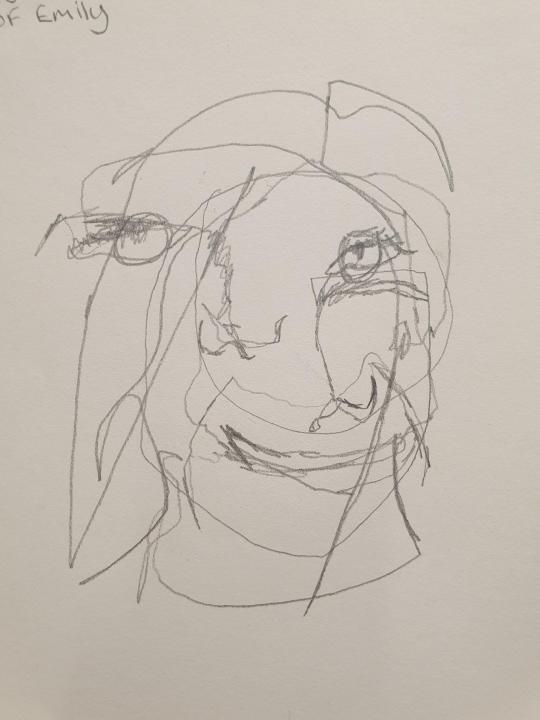
i did the same thing again in graphite and had got a better understanding of proportion considering we could not see the drawing.
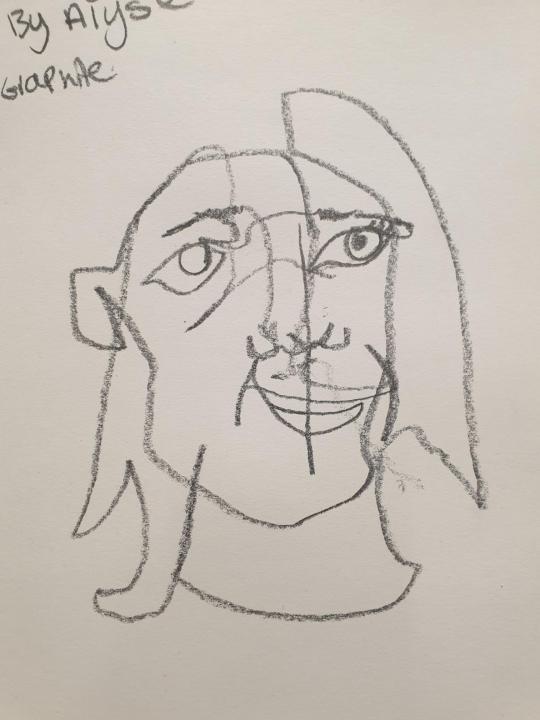
we then chose a unique image of ourselves, well mine was rather unique and we did a rough sketch to help us decide what we wanted to draw for our social realism drawing, i was quite impressed by my sketch the proportions were not half bad.
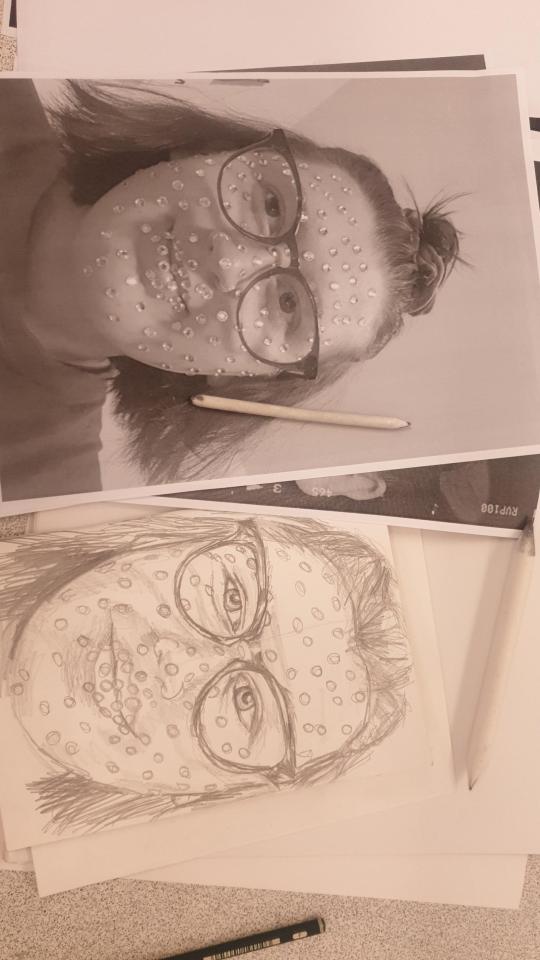
photo REALISM
i chose to just do the center of my face as i felt it would look the best in the social realism style, i then grid my drawing in 4 by 5 squares and did the same to my paper before then beginning my drawing of the outline and basic shapes in order for me to add tone and texture later on
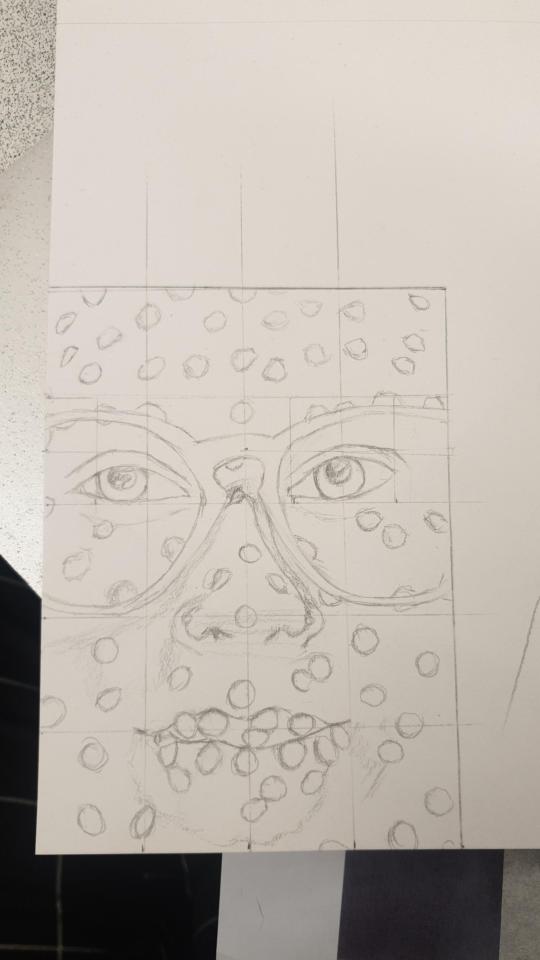
what is photo realism?
photo realism is a form of art where a drawing or painting looks absolutely identical to the object or photo it has been drawn from, so much so you cant tell the difference between the two, it takes time, patients and a lot of skill.
but most of the art community don’t consider this to be an art form.
Many would argue that the technical skill required to make Photorealism art can be exceeded by a decent color photocopier or a computer, thus avoid to use the word art in such context, but this discussion brings us to an analogy of photography. If photography is merely capturing an image of what is already there, where is the art in that? It is right there in the photographer’s perspective, the exact choice made by the person wielding the camera in what to capture and from which angle, moment and perspective. If a person creating a photorealistic recreation of a photograph doesn’t have that “artistic” input of a photographer, then what is artistic about the process? Some would say even those renditions are not strict interpretations of photographs, instead, they incorporate additional, often subtle, pictorial elements to create the illusion of a reality which does not actually exist, or cannot be perceived by the human eye.
In the end, as in many things in art, and life in general, the final conclusion remains behind the individual perspective
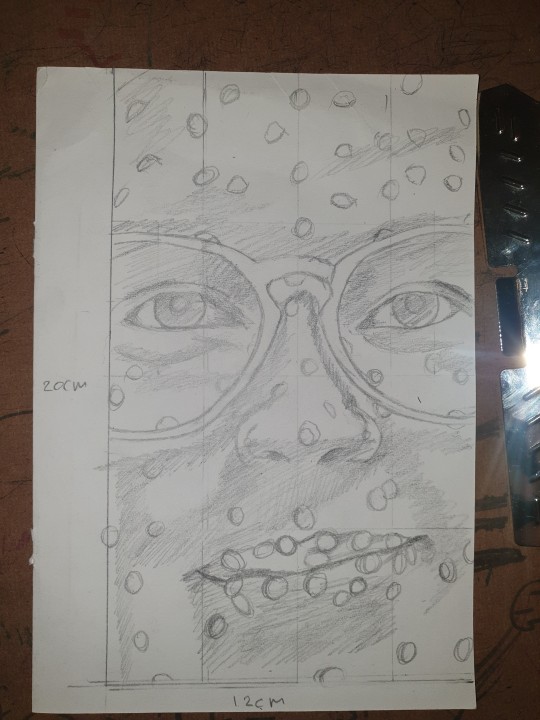
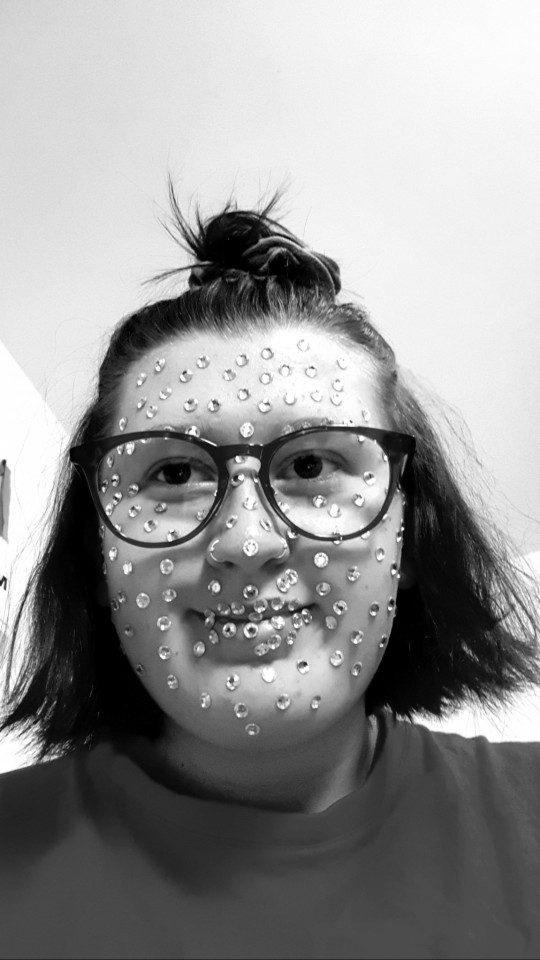
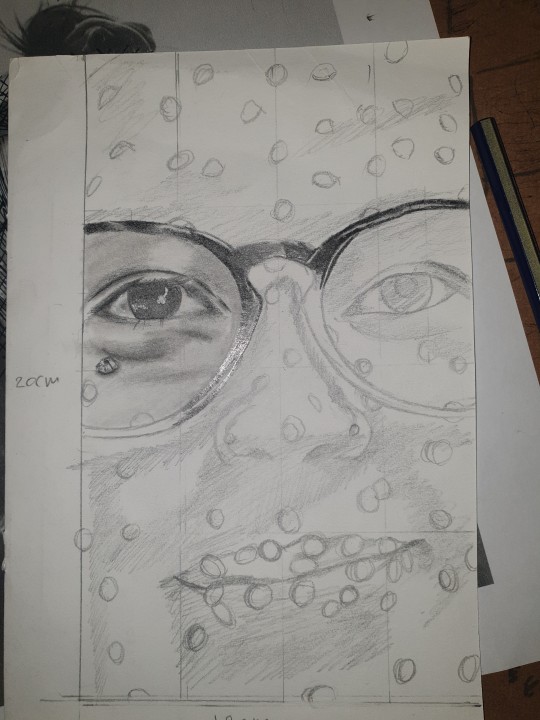
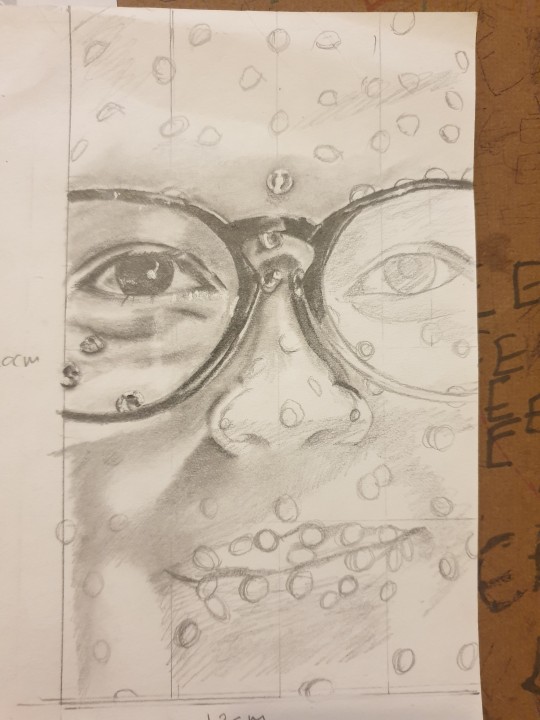
Da Vinci
Long recognised as one of the great artists of the Renaissance, Leonardo da Vinci was also a pioneer in the understanding of human anatomy. Had his ground-breaking work been published, it would have transformed European knowledge of the subject.
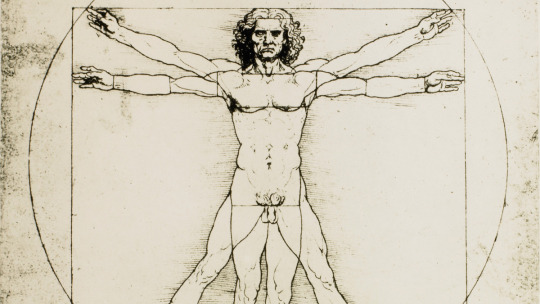
https://www.rct.uk/collection/themes/exhibitions/leonardo-da-vinci/the-queens-gallery-palace-of-holyroodhouse/explore-the-exhibition#/
At the outset of Leonardo’s career, anatomical illustration was in its infancy. To convey the three-dimensional form of the body and to show how it moves, Leonardo had to develop a whole range of new illustrative techniques. His challenges were in many ways the same as those faced by anatomists today, and some of Leonardo’s drawings are remarkably similar in approach to modern medical imagery, such as MRI and CT scans and 3D computer modelling.

Studies of Human Proportion
While studying Vitruvius for his work on the Milan and Pavia cathedrals, Leonardo became captivated by the ancient Roman architect’s detailed studies of human proportions and measurements. In addition, when he was measuring horses for the Sforza monument, he became interested in how they related to human proportions. Comparative anatomy appealed to his instinct for finding patterns across different subjects. So in 1490 he began measuring and drawing the proportions of the human body.

The construction lines and all of the annotation almost take away from the actual subject and become more of the focus, which was the main idea anyway It was not meant to be a work of art, but rather a manual for how to create it.
Da vinci was a polymath, a person of wide knowledge or learning. He was not only an artist but a scientist, sculpture and an architect.
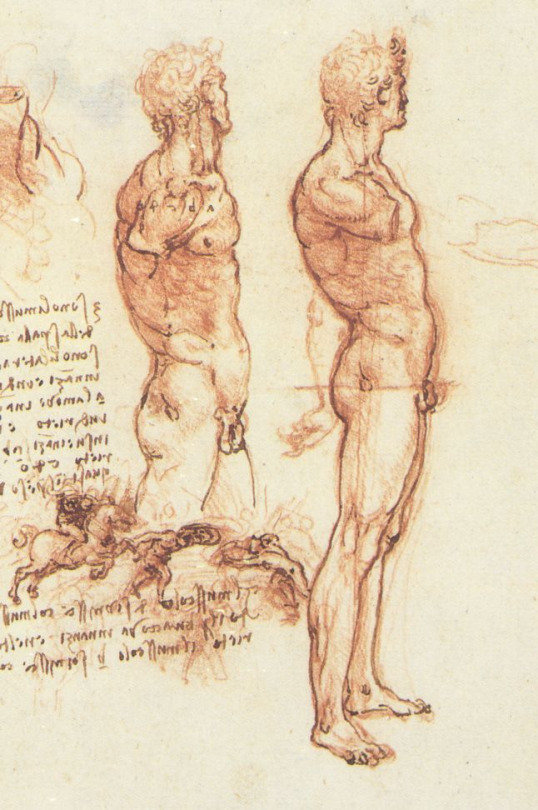
Frida Kahlo
was a Mexican painter known for her many portraits, self-portraits, and works inspired by the nature and artifacts of Mexico. Inspired by the country’s popular culture, she employed a naïve folk art style to explore questions of identity, postcolonialism, gender, class, and race in Mexican society. Her paintings often had strong autobiographical elements and mixed realism with fantasy. In addition to belonging to the post-revolutionary Mexicayotl movement, which sought to define a Mexican identity, Kahlo has been described as a surrealist or magical realist.
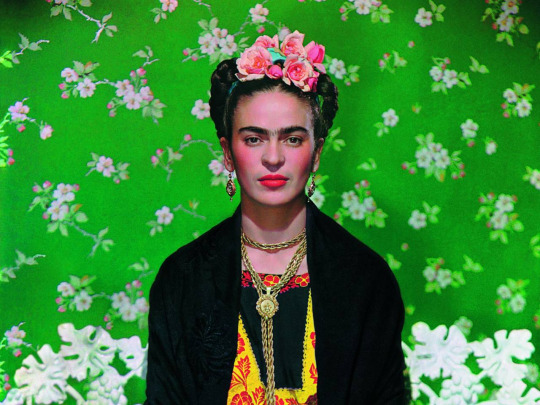

Kahlo’s paintings often feature root imagery, with roots growing out of her body to tie her to the ground. This reflects in a positive sense the theme of personal growth; in a negative sense of being trapped in a particular place, time and situation; and in an ambiguous sense of how memories of the past influence the present for either good and/or ill.[110] In My Grandparents and I, Kahlo painted herself as a ten-year holding a ribbon that grows from an ancient tree that bears the portraits of her grandparents and other ancestors while her left foot is a tree trunk growing out of the ground, reflecting Kahlo’s view of humanity’s unity with the earth and her own sense of unity with Mexico.[111] In Kahlo’s paintings, trees serve as symbols of hope, of strength and of a continuity that transcends generations.[112] Additionally, hair features as a symbol of growth and of the feminine in Kahlo’s paintings and in Self Portrait with Cropped Hair, Kahlo painted herself wearing a man’s suit and shorn of her long hair, which she had just cut off.[113] Kahlo holds the scissors with one hand menacingly close to her genitals, which can be interpreted as a threat to Rivera – whose frequent unfaithfulness infuriated her – and/or a threat to harm her own body like she has attacked her own hair, a sign of the way that women often project their fury against others onto themselves.[114] Moreover, the picture reflects Kahlo’s frustration not only with Rivera, but also her unease with the patriarchal values of Mexico as the scissors symbolize a malevolent sense of masculinity that threatens to “cut up” women, both metaphorically and literally.[114] In Mexico, the traditional Spanish values of machismo were widely embraced, and as a woman, Kahlo was always uncomfortable with machismo.[114]
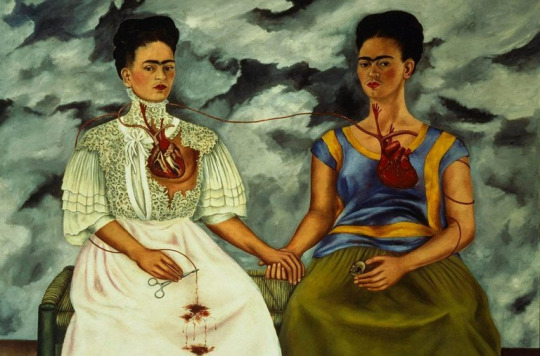
image taken at the MoMa in Nyc
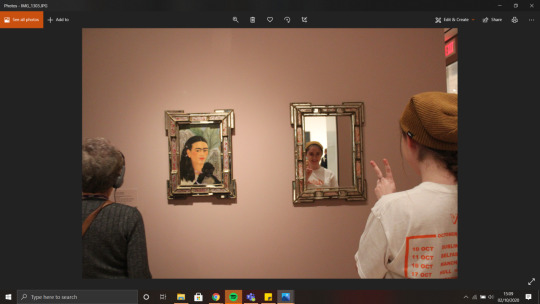
Fulang-Chang and I depicts Kahlo with one of her pet monkeys, interpreted by many as surrogates for the children she and Diego Rivera were unable to conceive. The painting was included in the first major exhibition of her work, held at Julien Levy Gallery in New York in 1938. In the essay that accompanied the show, the Surrealist leader André Breton described Kahlo’s work as “a ribbon around a bomb” and hailed her as a self-created Surrealist painter. Although she appreciated his enthusiasm for her work, Kahlo did not agree with his assessment: “They thought I was a Surrealist but I wasn’t. I never painted dreams. I painted my own reality.” Kahlo later gave this painting to her close friend Mary Sklar, attaching a mirror to it so that, if Sklar chose, the two friends could be together.
Tai Shan Schierenberg
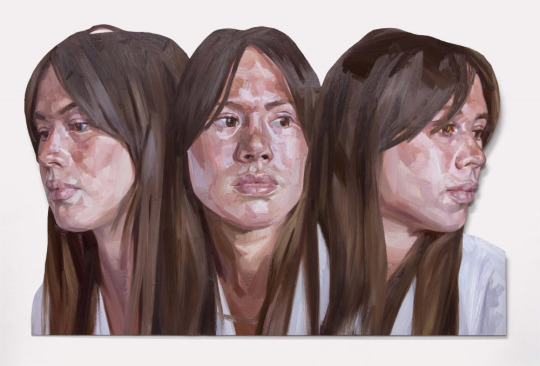
Tai Shan Schierenberg lives and works in London. He graduated from the Slade School of Art in 1987 and in 1989 won first prize in the National Portrait Gallery’s John Player Portrait Award. He was then commissioned to paint Sir John Mortimer for the Gallery. The National Portrait Gallery also holds his portraits of Lord Carrington from 1994, Lord Sainsbury, 2002 and most recently Seamus Heaney from 2004. Other noted commissions include Professor Stephen Hawking, Sir John Madejski and a double portrait of Queen Elizabeth II and the Duke of Edinburgh. For Schierenberg, there is an emotional charge that comes from the different textures and densities, and ultimately the light conditions, that occur in a place at a certain time. He describes his process in 2010: Painting and painting and painting, endlessly exploring ideas in paint on canvas, always painting my way. Finding that over time I can’t see the trees for the paint. Sometimes its good to try a new way, a different path, expose oneself to the vagaries of chance - and see the trees again.
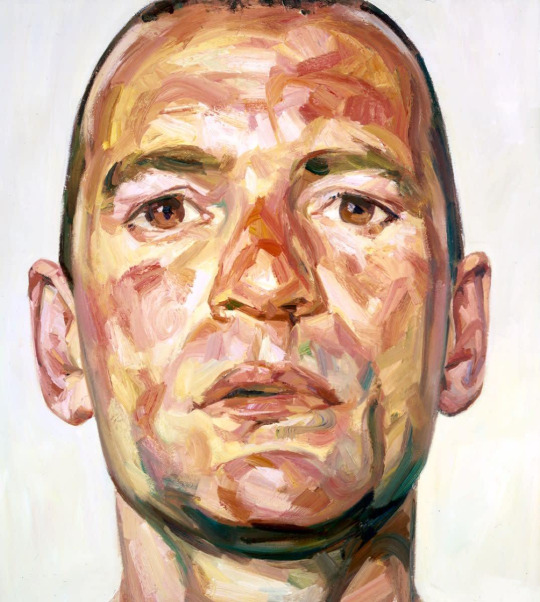
Before he finishes a commission, Tai-Shan Schierenberg usually splatters a bit of paint in the corner of the portrait. It’s not a stylistic move – the brushstrokes in his paintings are fluid but the images themselves are representative – but rather one which gives the subject something to complain about.
in the image above you can clearly see the texture and markings on the canvas, the artist uses oil paint on canvas and applies it using a pallet knife and a large brush, making various large strokes in the work. this gives a rough texture and edge to the piece.
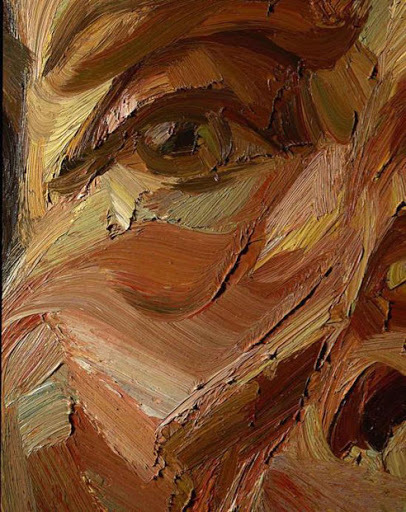
These instinctive visual images refuse to betray the plasticity of the medium. Unlike Freud, Schierenberg sees paint simultaneously as flesh. It is exactly this technique that establishes the major paradoxes characteristic of his work. It is both abstract and realist, edgy and sensitive, grand and inconclusive, violent and melancholic, physically intense and aesthetically detache

Lucian Freud
was influenced by surrealism, but by the early 1950s his often stark and alienated paintings tended towards realism. Freud was an intensely private and guarded man, and his paintings, completed over a 60-year career, are mostly of friends and family. They are generally somber and thickly impastoed, often set in unsettling interiors and city scapes. The works are noted for their psychological penetration and often discomforting examination of the relationship between artist and model. Freud worked from life studies, and was known for asking for extended and punishing sittings from his models.
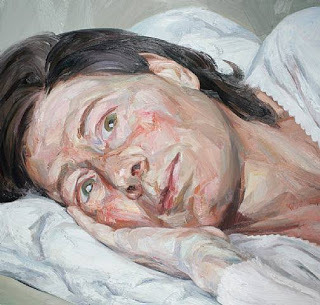
one of my chosen artists, tai shan sheirenberg seems to be heavily influenced by the style of lucian freud yet he made his own style, they both use the same meduims, oil on canvas also.
here in the colder tones we have a painting by lucian freud, you can see the texture of the brush strikes that help carve out the facial features.
here is a painting by tai shan, the tones are a lot warmer, they are not of the same person tho they look similar, you can see the brush strokes again on this image that help carve out the facial features, tho they are a lot more prominent in this painting as thats tai shans style, you see paint before you see the face .
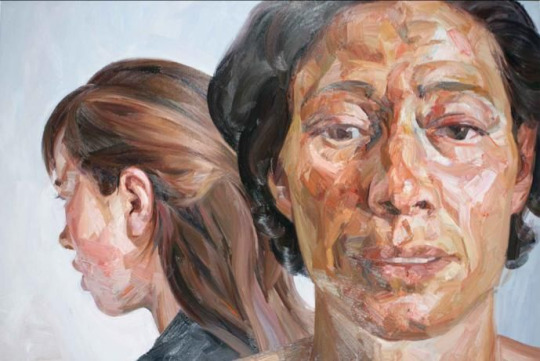
Interpreting line
The Visual Element of Line is the foundation of all drawing. It is the first and most versatile of the visual elements. Line in an artwork can be used in many different ways. It can be used to suggest shape, pattern, form, structure, growth, depth, distance, rhythm, movement and a range of emotions.

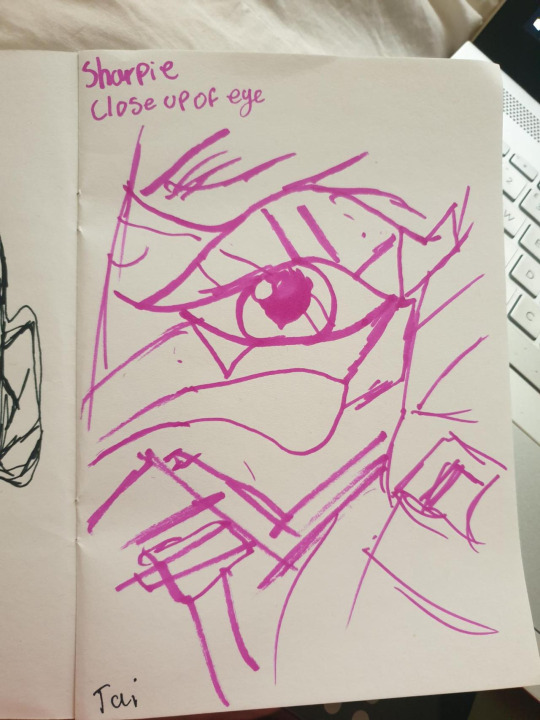

We have a psychological response to different types of lines:
Curved lines suggest comfort and ease
Horizontal lines suggest distance and calm
Vertical lines suggest height and strength
Jagged lines suggest turmoil and anxiety
The way we draw a line can convey different expressive qualities:
Freehand lines can express the personal energy and mood of the artist
Mechanical lines can express a rigid control
Continuous lines can lead the eye in certain directions
Broken lines can express the ephemeral or the insubstantial
Thick lines can express strength
Thin lines can express delicacy
2 notes
·
View notes